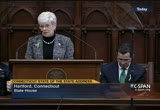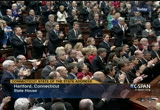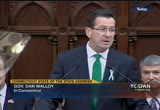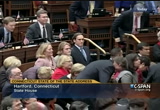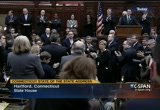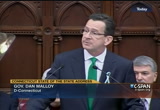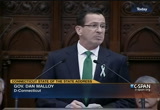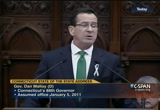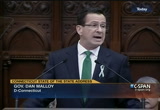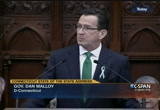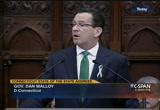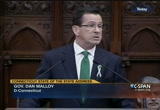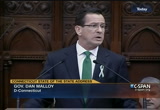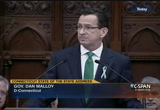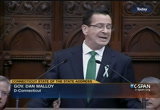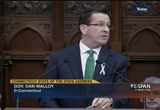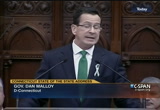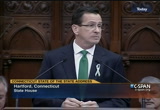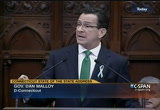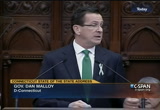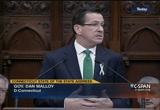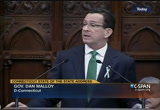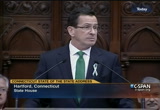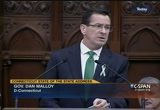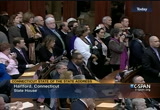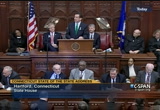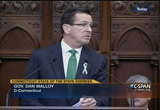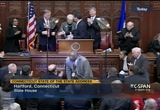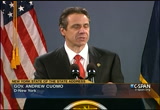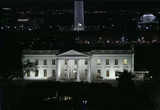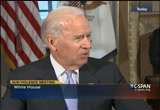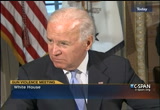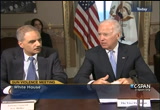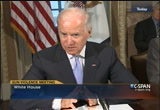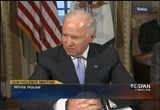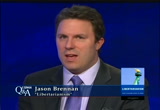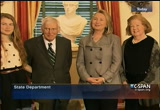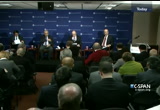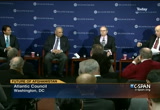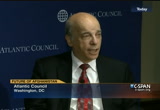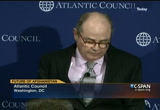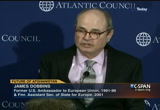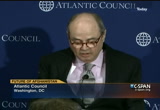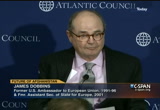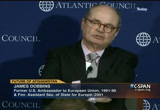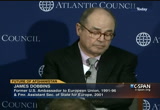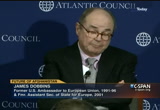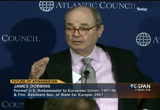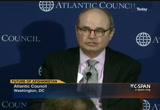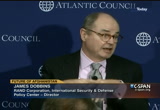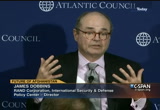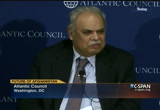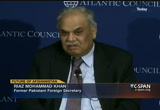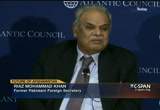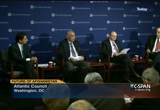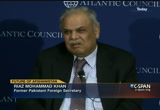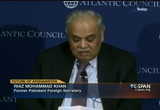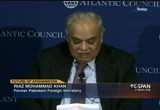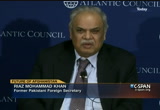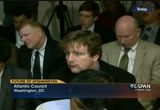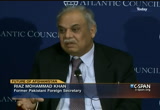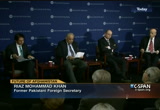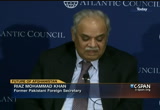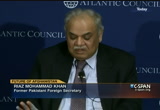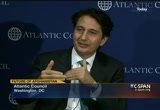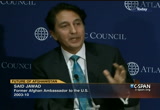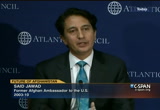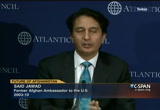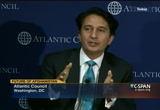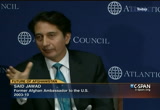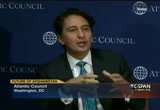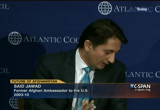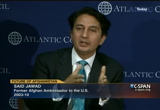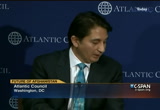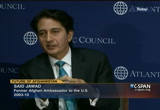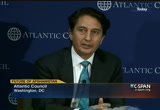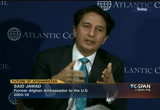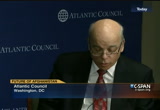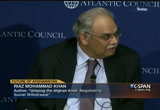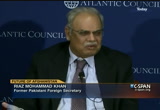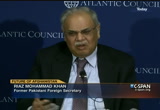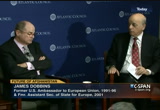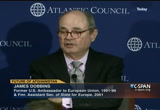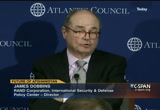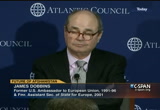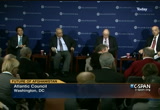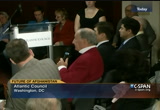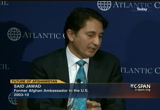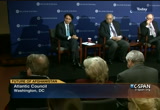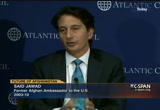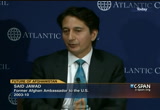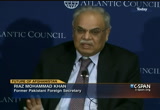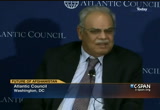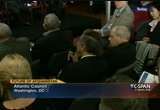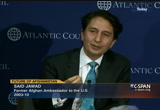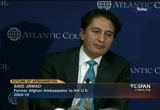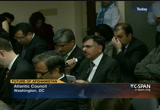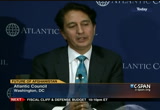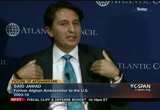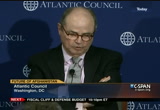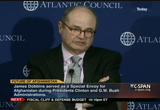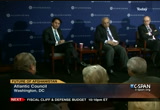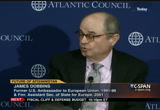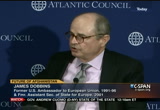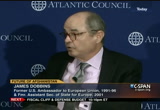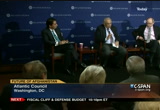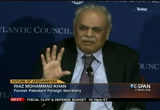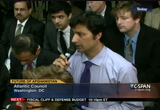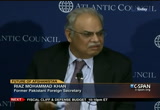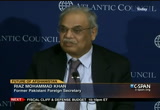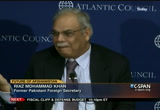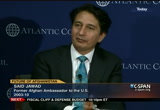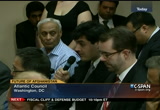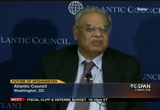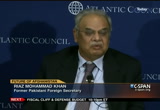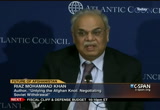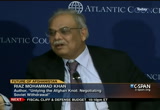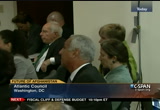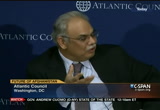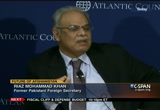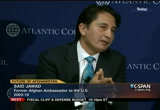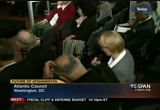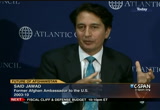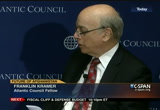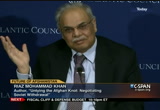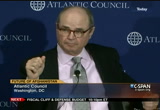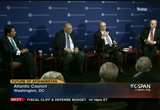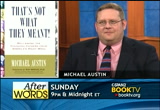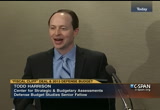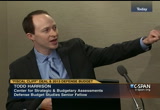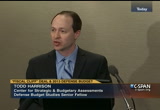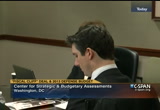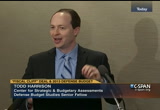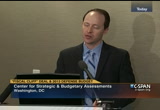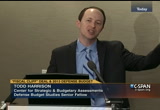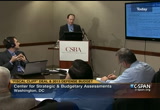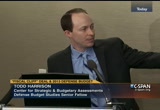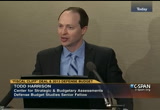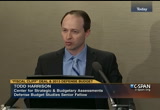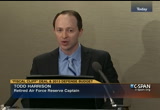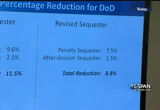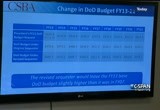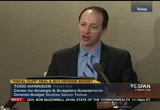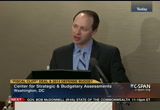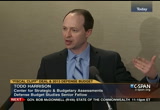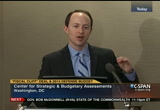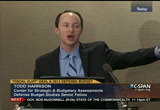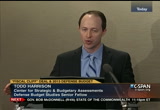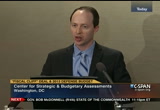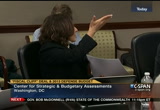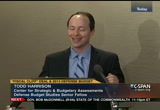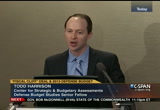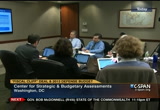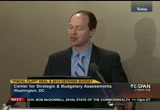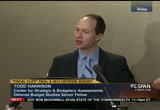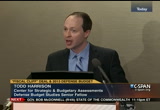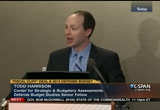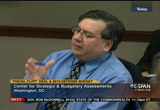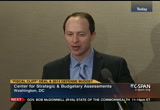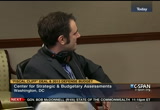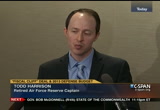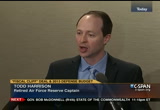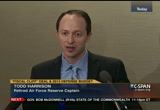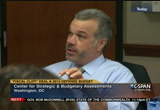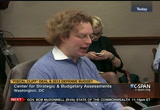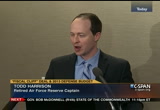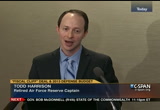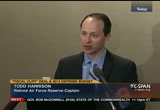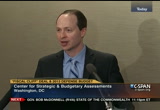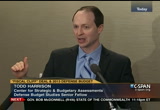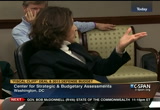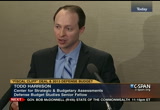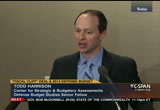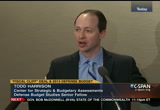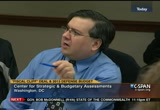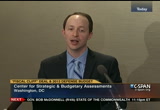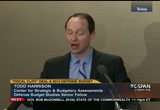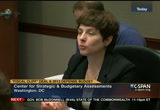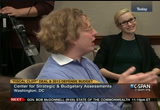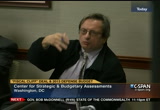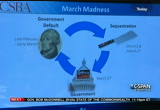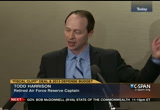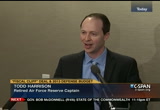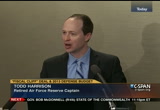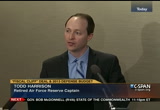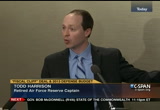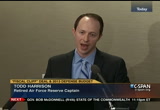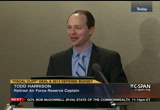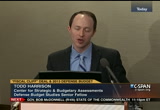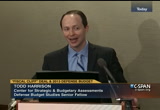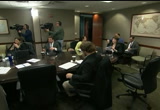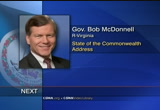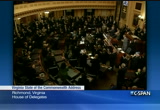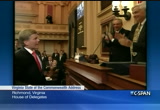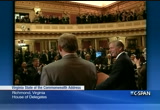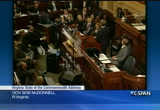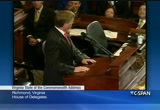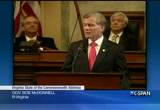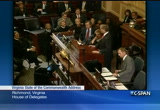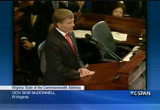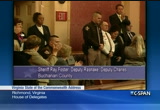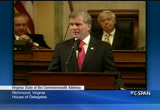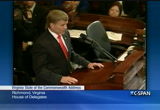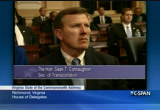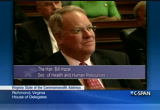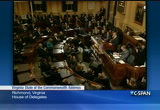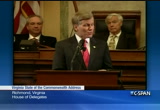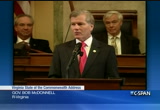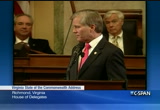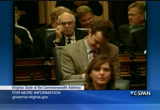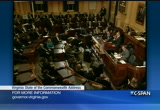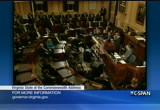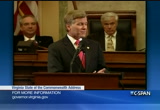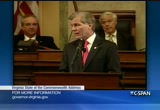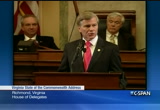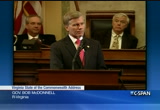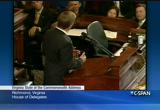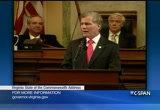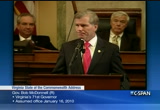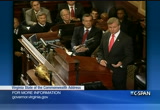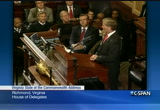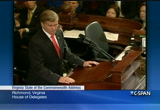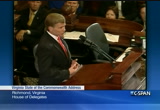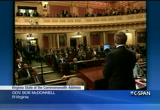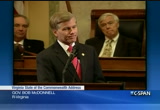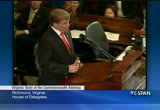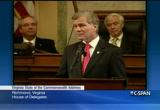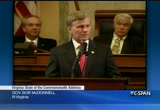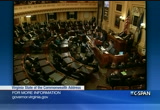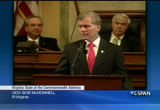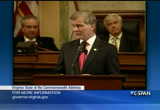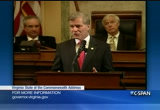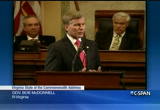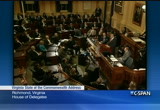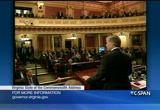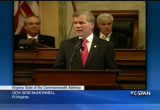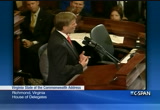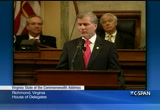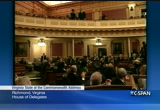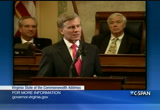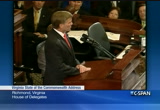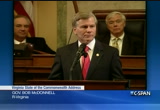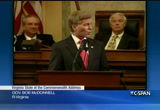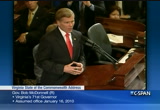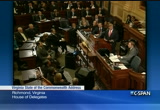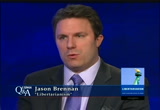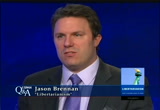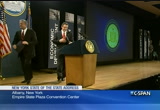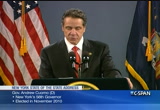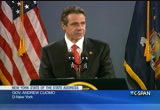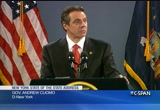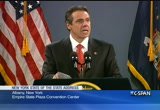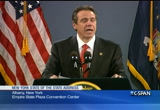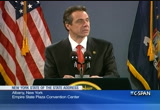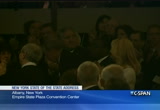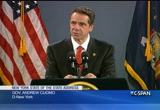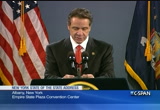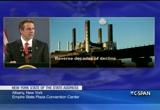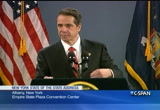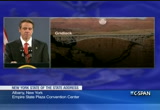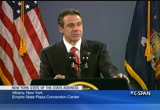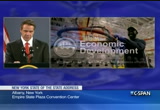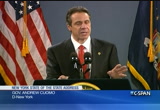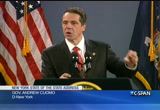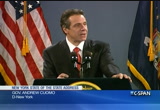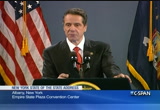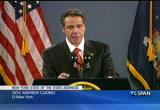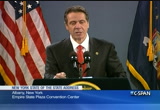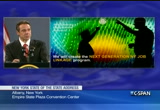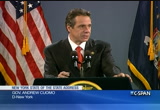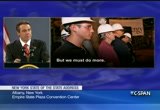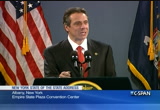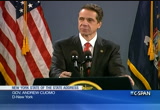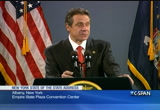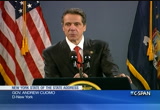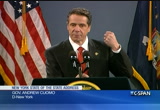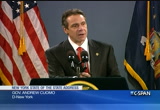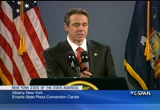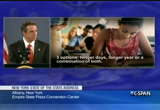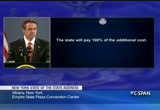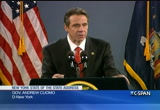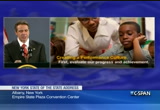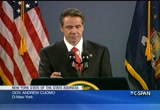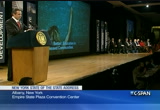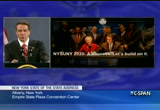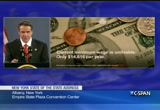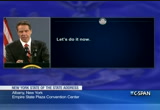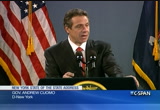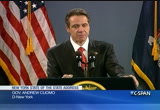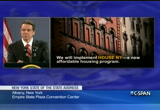tv Capitol Hill Hearings CSPAN January 9, 2013 8:00pm-1:00am EST
8:00 pm
a very, very difficult situation and helping with compassion and leadership and caring. in getting people's lives hopefully back on line again. ladies and gentlemen, i cannot tell you how proud i who has the compassion, who understands what vision is. he has no greater love for the state and people in it. our governor. [applause] >> thank you very much. thank you. we have work to do. thank you. thank you.
8:01 pm
mr. president, mr. speaker, senator mckinney, representative cafero, lt. governor wyman and my fellow state officials, ladies and gentlemen of the general assembly, honored members of the judiciary, members of the clergy, and all the citizens of our great state who are watching or listening today -- thank you for the honor of inviting me into the people's house to address you. i'd like to offer my sincere congratulations to the newly elected leadership of the democratic and republican caucuses in each chamber, and especially to speaker sharkey and majority leader aresimowicz as they take on their new roles. congratulations as well to the new members of the general assembly who were sworn in earlier today. i look forward to working with you in the months and years ahead. as we gather in this historic
8:02 pm
chamber, let us always keep in our thoughts the brave men and women of the great state of connecticut serving in our armed forces around the globe. we thank them and our veterans for their service and sacrifice, and we pray for their continued safety. i'd like to recognize my wonderful wife cathy and my sons daniel and sam who join us today. as i know is true for so many of you, i could not do my job without the tremendous love and support of my family. finally, we are joined by two of newtown's finest leaders -- first selectwoman pat llodra and school superintendent dr.
8:03 pm
8:04 pm
to me personally. it won't surprise you that this speech is very different from the one i first envisioned giving. in the early days of december, i began thinking about what i'd like to say. now, while it's only been a few short weeks on the calendar, we have all walked a very long and very dark road together. what befell newtown is not something we thought possible in any of connecticut's beautiful towns or cities. and yet, in the midst of one of the worst days in our history, we also saw the best of our state. teachers and a therapist that sacrificed their lives protecting students. a principal and school psychologist that ran selflessly into harm's way.
8:05 pm
our brave connecticut state police, newtown's local law enforcement, firemen, and others that responded courageously when called upon. in the aftermath, a selectwoman, a superintendent, and other local officials that have served around-the-clock bringing comfort and stability to newtown. and today, sandy hook's teachers are doing what they do best-- putting the interest of their students first as they return to classrooms, providing stability and continuity that has never been so important and so needed. and then, of course, there are the families. twenty-six families that despite an unimaginable loss have gotten up each and every day since, have been there for one another, and have supported their community as much as that
8:06 pm
community has supported them. they have persevered. and in that perseverance, we all find strength. we have lifted one another up and continued on, carrying the spirit of our fallen heroes, our wounded families, and our beautiful lost children. as a state and as a community, we will continue to do everything we can for the families of newtown. but we also must ask ourselves-- what is our responsibility? to those we've lost, to one another, to our children, and to future generations? during this legislative session, we're going to begin to answer those questions together. let us do everything in our power to ensure that connecticut never again suffers such a loss, that we take real steps to make our kids and our communities safer. last week, my administration announced the formation of the sandy hook advisory commission, comprised of experts in mental health, education, law
8:07 pm
enforcement, and first response. we may never know what motivated the events at sandy hook elementary, but that won't stop us from working to prevent future tragedy. over the coming months, the commission will come together to make specific, actionable recommendations in the areas of school safety, mental health services, and gun violence prevention. this session, i know there will be others that take action on these issues, and i applaud those efforts. the more resources we can bring to bear on this issue, the better. working together we can and will affect real change. there are some things we know already. we know that we must find ways to better respond to those with mental health needs. as a society, we have an obligation to take action in a meaningful way when a person seeks our help or demonstrates a need for it. we must balance our respect for individual rights with our obligation to provide for the greater public safety.
8:08 pm
and when it comes to preventing future acts of violence in our schools, let me say this -- more guns are not the answer. [applause] freedom is not a handgun on the hip of every teacher, and security should not mean a guard posted outside every classroom. [applause] that is not who we are in connecticut, and it is not who we will allow ourselves to become.
8:09 pm
we also know that this conversation must take place nationally. as long as weapons continue to travel up and down i-95, what is available for sale in florida or virginia can have devastating consequences here in connecticut. there will be more to say in the weeks ahead, but let me be clear today -- our focus will be first and foremost on protecting connecticut's families. those conversations won't always be easy, but as your governor i've learned there is no challenge we will face that can't be overcome with the power of our community. we have come together time and time again. we've done it with purpose because we know there is something bigger and more important than who we are as individuals. my friends, as we begin this legislative session let us be guided by devotion to the common good, by faith in one another, and by a determination to work together to make our
8:10 pm
community as strong as it can be in every way. looking back over these past twenty-four months, we've faced many challenges together-- the largest per-capita budget deficit in the nation, a struggling economy, a fractured public school system, untenable energy costs, and natural disasters the likes of which our generation had never seen. and then, in december, just when we thought the worst had happened -- it actually did. the people of connecticut, the communities you represent, and all of us in this chamber when tested, we met those challenges head on. we did as our forefathers did, as our grandparents and parents taught us. we dug in. we banded together. we decided to focus not on what makes us different, but on what makes us the same our common humanity. it is this core strength and spirit of community that
8:11 pm
brought us together to accomplish so much on behalf of the people of connecticut. two years ago, we faced the single largest per-capita deficit in the nation. it was a problem decades in the making. we knew that getting our fiscal house in order was critical to creating jobs. connecticut employers needed a responsible and predictable partner in state government. we came together and passed a balanced budget. we cut more than we added in new revenue. and even after revenues came in short as they did in 31 other states we know today that our budget as-enacted fixed more than 90 percent of the problem. last month, democrats and republicans came together to make sure we closed that final gap without raising taxes. anyone who tells you that the budget we passed two years ago didn't do its job, that it didn't make real change in how we approach our finances, is simply not telling the truth.
8:12 pm
i know that many of you cast hard votes to fix those problems. that's the kind of resolve and leadership that we're bringing back to connecticut. we've made other tough decisions along the way. after years of underfunding our pensions, a $4.5 billion payment would have been required in the year 2032 more than four times what we'll pay this year. it would not have been possible. that's why last year we restructured our payments to reverse years of chronic underfunding. we're avoiding our own fiscal cliff and saving connecticut taxpayers 6 billion dollars over the next 20 years. we didn't kick the can down the road we picked it up. through a restructured benefits and pension agreement with our public employees, we're saving the state approximately $20 billion. and we made sure that state government tightened its own
8:13 pm
belt in other ways. we shrunk the number of state agencies by more than 25 percent. we trimmed executive branch employees by more than twelve hundred over the past two years, including more than a ten percent reduction in the number of state managers. as we've done more with less, so have our hard-working state employees. they've adapted and found new ways to continue providing critical services to state residents. we've all had to buckle down and make tough choices. we're going to make more of them in the weeks and months ahead. recently, there's been a national conversation about economic development, about whether it makes any sense to have states competing against one another for jobs. it's a good conversation to have, and it's the right time to have it. but a dialogue on the best way forward can't be an excuse for standing still. we see that too often in washington. i believe that each one of us
8:14 pm
in this chamber must approach this session with a core guiding principle -- until every person in our state who wants a job can find one, we have more work to do. [applause] we can't stick our heads in the sand or simply hope for the best. not when other states are actively recruiting jobs from every corner of the globe jobs that can and should come to connecticut. we must compete for every single job. with that mindset, we've begun to tackle the challenge of economic development in a holistic way. our first five program, along with the addition of jackson laboratories, has leveraged 180 million dollars in public funding to drive more than two billion dollars in private
8:15 pm
investment. that same program made it possible for connecticut to bring two fortune 500 headquarters to our state. the last time connecticut was talking about two fortune 500 companies was in 2006, and it was because they were leaving. on main streets across connecticut, the small business express program is giving local employers the chance to expand and create jobs. it was because of this program that bevin brothers manufacturing in east hampton was able to rebuild after a fire ravaged their historic bell factory. they purchased new equipment and got their employees back to work. just a few months ago, i announced the third plank of our economic development strategy the innovation ecosystem. the program has one goal connecting people that have good ideas with capital investors. it will create new, high-skill jobs jobs with good wages, jobs with good benefits.
8:16 pm
we're off to a good start, but it's only a start. the key is making government an active partner rather than a bystander who watches markets develop elsewhere. by investing in growth industries like bioscience and digital media, by recruiting companies like jackson laboratory and nbc sports, and by standing with our small businesses and start-ups, we're taking steps to make sure that connecticut leads the way. when it came to education, the stakes were clear-- take action together or risk losing an entire generation of young people to failing schools and a widening achievement gap. i am proud that after a long and hard debate, we were able to say with one voice that the status quo is no longer acceptable, that when it comes to public education we can't keep doing what we've always
8:17 pm
done and hope for better results, that our kids can't afford it, and neither can our state. we worked with an eye toward the future and made an historic investment of nearly 100 million dollars, from pre-k through high school, focusing on districts that we know are most in need. reaching kids early is critical to success, and early childhood education had to be a central part of reform. we created 1,000 new school readiness openings statewide for our youngsters at a time when no one thought that was possible. that's 1,000 more children that will show up to kindergarten on day-one ready to learn. we did that together, and we'll do more. to combat an unacceptable achievement gap, we've begun transforming our underperforming schools through the newly
8:18 pm
created commissioner's network. four schools have already volunteered and are benefiting from intensive intervention, increased instruction time, and improved collaboration among teachers and administrators. i've visited these four schools in bridgeport, hartford, new haven and norwich, and each exhibits a new energy and renewed sense of purpose. more schools are lining up to be transformed in the years ahead. of course, reform could not be complete without supporting our teachers. they have dedicated their lives to our children, and for the first time in a very long time, we're dedicating new resources for them. we know success is possible. we've seen it. with a cooperative effort where every voice is heard, we're going to replicate it in classrooms around our state. the bottom line is that students are going to be better prepared
8:19 pm
for school today, and for the job market tomorrow. [applause] when it came to energy, our state had been a national leader for years, in the worst possible way. we had the highest electric rates in the continental united states rates that were squeezing the budgets of families and businesses. we came together. we decided we needed a plan to take these problems head-on. we realized that our environmental, energy, and economic needs were all related, and that the path we chose would impact our economy for years to come. we consolidated state agencies to better coordinate our energy functions. we strengthened programs promoting renewable power and energy efficiency leveraging private capital to deliver
8:20 pm
renewable energy at a price lower than almost anywhere else in the united states. today, we've seen electric rates drop in connecticut by 12 percent across the board. we can't stop now. the comprehensive energy strategy that my administration announced this past october shows us the path forward. together, we will expand cheaper, cleaner, and more reliable energy choices for consumers, enhancing efficiency programs for all communities, at the same time helping to create thousands of new jobs. putting connecticut businesses and consumers in control of their energy future will have a real and immediate impact. look no further than modern woodcrafts, a locally-owned company in plainville. they invested in the kind of energy efficiency initiatives
8:21 pm
that our state plan will promote. they've seen more than $35,000 per year in savings on energy costs. or in woodbridge, where amity high school will have an annual budget savings of $120,000 after the town made a conversion to natural gas. across connecticut, we are taking control of our energy future. [applause] high energy prices, struggling schools, a broken budget, a sluggish economy. all problems that every person in this room knew we were facing two years ago, and we have faced them together. other challenges we didn't see coming. in 2011, connecticut was rocked by the worst winter in our history, two storms packing a
8:22 pm
one-two punch the likes of which we hadn't seen in more than 25 years. tropical storm irene and the october nor'easter revealed holes in our emergency response system that should have been addressed years, if not decades ago. it was a wake-up call -- and we woke up. we put in place new procedures to better coordinate our emergency response infrastructure. we commissioned a "two storm panel" to investigate exactly what went wrong and to determine what needed to be done to prevent unacceptable power and communication disruptions. that panel led directly to the passage of tough new laws, laws that hold connecticut utility companies accountable for how they respond to emergencies. and we created a new energy micro-grid program to increase energy reliability in critical areas. these weren't quick fixes or window dressing. they were the result of saying we'd had enough it was time to do more. what does it all mean for connecticut residents? we know
8:23 pm
we will again feel the brunt of powerful weather. but we can tell our citizens that their state is more prepared for future challenges, that their families will be safer when disaster strikes, and that the odds of anyone having to needlessly suffer through prolonged power outages have been greatly diminished. when hurricane sandy struck, we saw results from the work we'd done together. while we can never entirely prevent damage or power outages, the response was better and faster. once again, we saw a problem and, together, we worked to address it. if these past two years have proven anything, it's that we have the ability to rally around a common good and a common goal. we've done it in a way that just doesn't seem possible these
8:24 pm
days in some places certainly not in washington d.c. in december, at the same time leadership from each of your caucuses were meeting with my staff for long hours night- after-night to negotiate a mitigation plan, our national budget was being driven toward, and then off, a fiscal cliff. while we've worked to manage our state's finances, national inaction hangs like a dark cloud over our budget. for the many connecticut families with someone working in our defense industry, washington's inability to address problems on a reasonable deadline is causing sleepless nights. it's unnecessary. and earlier this month, while many families and small businesses were still working to recover and rebuild from hurricane sandy, the gears once again ground to a halt, slowing the process of getting aid to those who need it most. it's unacceptable.
8:25 pm
i say this not to demean any of our colleagues in washington but in the hope that we will better appreciate what we've accomplished here in connecticut. two years ago, you first welcomed me into this chamber. i spoke then about the challenges we faced, and about the opportunities that we knew were within our grasp. i spoke about who we are as a community. about the ingenuity, the resolve and the resilience that has defined connecticut over centuries. about eli whitney, prudence crandall, and harriet beecher stowe. about a history of overcoming challenges together. my friends, that is still who we are today. we've come a long way in two years, and we've done it together as a government, as a community, as a state.
8:26 pm
in 2013, let us honor one another, let us honor our renewed community, and let us honor those we've lost. we have a great deal of work to do. but if history is any judge, we will rise to the occasion. when called upon, we will answer as we've done time and time again as one people, one community, one connecticut. [applause] as we begin our work,may god bless you, may god bless the great state of connecticut, and may god bless the united states of america. thank you. [applause]
8:27 pm
[captioning performed by national captioning institute] [captions copyright national cable satellite corp. 2013] >> we need a gun policies that is reasonable, balanced, measured. we respect hunters and sportsmen. this is not taking away people's guns. i own a gun. i own a remington shotgun. i have hunted, i have shot. that is not what this is about. it is about ending the unnecessary risk of high- capacity assault rifles. and that is what this is about. [applause]
8:28 pm
we have a seven point agenda. one, in act the toughest assault weapon ban in the nation, a period. [applause] two, close the loophole by requiring federal background checks. ban high-capacity magazines. four, enact tough f penalties fr illegal gun use and guns on school grounds. five, keep guns from people who are mentally ill. 6, banned direct sales of ammunition in new york. 7, create state check on all ammunition purchases. [applause] >> we will bring you the rest of the new york state of the state address later tonight, or you can watch it any time on our video library at c-span.org. vice-president biden is heading a white house task force on gun
8:29 pm
violence. he met with representatives of organizations advocating stricter gun laws. the vice president will meet tomorrow with the nra and other gun rights groups. hear the remarks of the start of today's meeting. >> on behalf of the attorney general and the president, i thank you for taking the time today. this is important work. we have a lot of work to be done. i know several of you around the table have lost loved ones or have been the victims of gun violence yourself. something almost four weeks now since the tragedy in newtown, connecticut. i have been doing this ceylon tragicnd tha of all the events we have endured, i do not think anything has touched the heart of the american people so
8:30 pm
profoundly as seeing those young children not only been shot but riddled with bullets. every once in a while there is something that will awaken the conscience of the country. that tragic event did it in a way like nothing i have seen in my career. so we are here today to deal with something that requires immediate action, urgent action. the president and i are determined to take action. this is not an exercise in a photo opportunity or just getting to rescue wall what your opinions are. we are vitally interested in what you have to say. as the president said, if our actions only save one life, they are worth taking. but i am convinced we can effect the well-being of millions of americans and take thousands of people out of harm's way if we
8:31 pm
act responsibly. today i want to hear about your experiences firsthand. i have taken the time -- jim brady and his family are friends of mine. they used to be the -- he used to be the colleague of my press secretary. as chairman of the judiciary committee -- i have been working in this area for a long time. i want you to know that we are meeting with a number of advocacy groups. we have reached out to beyond just gun safety. we have reached out to the mental health community, we have reached out to do doctors and nurses. we have reached debt to the religious community. i am heartened by the incredible
8:32 pm
response we have seen from the southern baptist conference, the catholic conference, bishops, evangelicals groups. i have not seen anything quite like that occurring before. we did not even have to reach out. they reached out to us. this is a moral issue as well. you are going to read and hear that will be conducting meetings today and tomorrow and friday and beyond. i want to make it clear -- we are not going to get caught up in the notion that unless we can do everything we will do nothing. it is critically important we act. there are certain things and meles great deal about, all of your organizations. i have read what you have published and spoken to. there is a pretty wide consensus on three or four or five things
8:33 pm
in the gun safety area that could and should be done around this table. you should know that tomorrow i have also invited gun owners and the nra to come and make their case as well. before us. i want it clear to the american public that we are reaching out to all parties on whatever side of this debate you fall. but the president is going to act, executive order, executive action can be taken, we have not decided what that is yet. but we are going through it all with the help of the attorney general and the cabinet members. as well as legislative action, we believe is required. so i appreciate you very much being here. with that, what i would like to do is thank the press for coming on in and maybe we can get to work. >> the new congress is expected
8:34 pm
to debate the nation's immigration laws and policy this term. on tomorrow's "washington journal, we talked to fawn johnson of the national journal about congress and immigration, and a discussion on the naturalization process and requirements for u.s. citizenship. we hear from daniel stein of the federation for american immigration creform. later, an update on state and federal immigration law enforcement. a guest of the national immigration forum and of the center for immigration studies will join us. we will also take your calls, emails, and tweets. each morning, live at 7:00 a.m. eastern on c-span. >> if you ask how many are self identified libertarians, who describe themselves as libertarians, you might be getting between 10% and 15%.
8:35 pm
if you ask questions like, given a battery of questions about different ideological things, do you believe in x or y and track them to different ideologies, you get up to maybe 30% of americans calling themselves libertarian. if you ask the following question -- are you economically conservative but socially liberal, you get over half of americans calling themselves what they are. that said, just because people say these things does not necessarily mean they really believe them. if you ask most americans, and he wants more government, they say yes. if you say you want government to spend less money they say yes, but if you ask them to cut any particular item did not want to cut anything. it is not really clear, but based in the best data i have writing this book, i have to say roughly 10% or at its highest 30%. libertarians, if they were conscious and political, they
8:36 pm
could be a big movement. it could be a big group of people with a shared ideology and a lot of influence in politics. but for various reasons they're not organized that way. >> a political primary in libertarianism. on what you might not now. sunday night at 8:00. >> secretary of state hillary clinton returned to work today after being sidelined with a concussion and a blood clot. she was released from a new york hospital last week after three days of treatment -- treatment for that blood clot. she is stepping down from her cabinet post but has said she will stay on the job until the confirmation of her successor. the president has nominated sec -- senator john kerry to take over the job. she spoke briefly with reporters today. >> welcome back to work. >> thank you. i have to say, i really miss you all.
8:37 pm
i would not say that under normal circumstances. >> he knows a thing it to about contacts sports. >> that is why i now have a helmet, as you saw. >> how does it feel to be back? >> i'm thrilled to be back. i am also incredibly grateful to this fabulous team that i have here at the state department who never missed a beat for the time that i was away. we are focused on continuing our work, finishing up everything that we can, and helping senator kerrey with his transition. >> your back? >> i'm back. it is obviously somewhat bittersweet, because i have had the most extraordinary experience and i work with just
8:38 pm
an amazing team of people, but i am very much looking forward to doing everything we can to resolve and finish up whenever possible and to have a very smooth and seamless transition to senator kerry. >> and then retirement? >> i do not know. certainly stepping off the fast track for a little while. thanks. great to see you. thank you all. >> secretary of state clinton is expected to testify before congress for the last time january 22. the senate foreign relations committee will be questioning her on the attack on the u.s. consulate in benghazi, libya. next, u.s., afghan, and
8:39 pm
pakistani diplomats talk about the consequences of the removal of coalition forces scheduled for 2014. afghan president hamid karzai is in washington this week to meet with the president and other senior officials. this is an hour and a half. i am delighted to have you all. distinguished guests. it is pretty rare to get three extraordinary ambassador sitting next to one another. each has tremendous familiarity with the subject. the council has been working on these issues for a number of years. this is the fourth anniversary of our south asia center. some of you may remember a few years ago the council did a substantial report with respect to afghanistan. the then-head of the council became the national security adviser, jim jones. we followed up on the work continuously over the last
8:40 pm
several years. this is the latest installment, if you will. i think you all know we are at an inflection point, with respect to afghanistan. a lot of important decisions coming. president karzai is here to meet with president obama on friday. what is said here, i am sure, will shape the contours of that meeting. we have ambassador james dobbins, who was our u.s. ambassador to afghanistan, among many other things. he is now at the rand institute. we have ambassador kahn, who was the foreign minister, and i believe is the ambassador to china. we have the ambassador of afghanistan to the united states. all of whom have been intimately involved with respect to the important issues regarding pakistan, with respect to the important issues regarding the region.
8:41 pm
we called the event "back to the future." some people have spoken before about this, and what we mean by that. i think we will let that emerged as the discussion goes on. we know we have a lot of fundamental issues to talk about. certainly, military presence has been an issue talked about in the newspapers all lot. governance is an important issue. technical issues, such as what type of agreements might be signed between the u.s. and afghanistan, are important. the role of pakistan. many others. with that, let me turn to our three speakers, each of whom will speak for six to 10 minutes, roughly speaking. then we'll open it up to dialogue, with the audience. i will give you the floor. >> my responsibilities for afghanistan go back to 2001. it is fair to say i was present at the creation of at least the
8:42 pm
current regime in kabul. i started by looking back and trying to spot the things we did wrong. it strikes me that there were three fundamental errors, two of which are perceived at the time and tried to do something about, and one of which i failed to perceive entirely and did nothing about. one was the decision not to deploy any american or international peacekeepers. we had a country that had no police force and no army. we decided security would be an afghan responsibility in the aftermath of the fall of the taliban. i think that was a major mistake. the second was to allow the coalition we had successfully built for the war and for the peace conference to disintegrate. iran had been very helpful. week rebuffed offers of further
8:43 pm
help. pakistan had at least then not actively and helpful. but we failed to keep them up to that standard in the succeeding years. the third error which i failed to perceive was a failure to pursue reconciliation much earlier than we finally did. there were a certain proportion of the taliban leadership that were prepared to be cooperative, that would have collaborated. instead, we sent them to guantanamo, and sent a negative signal to those who might consider who being coopted into the new system. it took us almost a decade to reverse that policy. nevertheless, despite these
8:44 pm
problems, and despite the fact that now, more than 10 years on, we are still engaged in a counterinsurgency campaign in afghanistan, i think we have come a longer way than many of us realize. some of this is reflected in a recent poll the asia society put out a few weeks ago, which showed, in contradiction to american opinion about afghanistan and america, a fairly high degree of optimism. 52% of afghans think their country is going in the right direction. this is up from last year, not down. 53% say they are more prosperous now than they were five years ago. the reasons they cite are better security, more schools, more reconstruction. it is also interesting to point out that the non-optimistic side is not 48%, because there
8:45 pm
are some who are undecided. the non-optimistic side cited were security as their concern. clearly, there are differences in perception. interestingly, support for reconciliation, coopting the taliban, is at 81%, very high. not that high in the communities that are not pashtun, but still well over 50% in those communities. confidence in the afghan army, 93%, in the police, 82%. in the government itself, 75%. those figures compare pretty favorably to comparable polling in the united states, of our confidence in our own institutions. interestingly, 79% of the people think the government is corrupt. it is not just that they were giving answers they thought the pollsters wanted. there were quite critical of the government. but they also had a balanced
8:46 pm
approach. they can cite the government as being, on balance, better than most they have experienced in their lifetime, while feeling it is corrupt and something ought to be done about it. the polls after the presidential election several years ago showed the same results. that is, most afghans thought that karzai's presidential election had been very corrupt, and most of them were very satisfied with the result. they could hold both concepts, which our own media seems unable to do. we recently did a study which i think puts afghanistan in some perspective. that is rand. it is about to be published. we looked at 20 post-conflict reconstruction efforts, peacekeeping and peace enforcement. bosnia, kosovo, somalia, haiti,
8:47 pm
iraq, afghanistan and, and smaller u.n. once in a dozen or so other places. we evaluated them on a number of criteria. did it produce peace, which is why most of them were deployed? also, did they produce more democratization? we used freedom house scores to rank them. did they produce better government? we used world bank indexes. every year, the rate every government in the world. did the economy expand? again, world bank and imf figures. and did the lot of the citizens improve? we used the undp human development index, which looks at levels of income, but also education, health, and other criteria. in democratization --
8:48 pm
afghanistan did not pass the peace test. 16 of the 20 cases did. that is a failure. in democratization, it was about in the middle. it improved its freedom house score by 15%. in government effectiveness, he interestingly, and in distinction to everything we heard, it ranks second of the 20 countries. it had the second-highest improvement. it is not the second highest in the end, but its rate of improvement is the second highest. in per-capita gdp, again, the second highest. per-capita gdp has increased by 130% since 2001. interestingly, in the human development index, it was the
8:49 pm
highest. of all 20, it showed the greatest improvement in human development, which is a combination of standard of living, education, and health, those kinds of criteria. it is easy to see why afghans tend to be more optimistic than we think they should be. indeed, in many cases, more optimistic than americans about america's own future. longevity is way up. infant mortality is way down. literacy is up. if the number of afghan children in school today stay in school 10 years, the literacy rate will be three times higher than it is. asia society did not pull in the most violent areas. the numbers almost certainly would be lower in those areas. someone has to account for that. the number of areas they failed to pull in and are relatively
8:50 pm
limited. there was a long story in "the new york times" today, on the front page, about levels of anxiety over troop withdrawals. the anxiety is in the area's last cleared the most exposed to taliban return. the story is about high levels of concern and pessimism. i am not arguing that it is not correct. i am simply arguing it is not reflective of the attitude in most of the country, as far as it can be determined. clearly, there are two transitions coming up. there is the transition from a u.s. and nato-led operation to afghan-led operations, and the transition from a karzai government to a somebody else- led government. the later transition is by far the more dangerous and difficult, and the more
8:51 pm
uncertain. i do not think the afghan army is going to run away in 2014, but it is possible the afghan government will collapse in 2014, as the result of a failed transition. by that, i do not mean the election will be irregular, necessarily. a regular election could produce an unusual result. it is a two-round system. it is possible that in the first round, he would have 58 candidates. none would get 10% of the vote. you have a second round of two candidates, neither of whom had gotten 10% of the vote. that kind of result probably would not be enough to hold the country together. i think the concern about corruption in the government is
8:52 pm
accurate, real, and valid. but it does miss the point that it is as much corruption as formal institutions that hold that country together. karzai has built an effective patronage network that allows him to exert significant influence across sectarian lines and across geographic lines. formal institutions that have been built since 2001 simply are not up to exerting that degree of control and influence. the big question is, can a successor both assume control over the formal institutions of government, but also have a broad enough patronage network, a political machine in enough of
8:53 pm
the country so that he can at least replicate karzai's success in this regard. i think as we tend to evaluate the forthcoming transition in afghanistan, that is the question we need to be asking. >> thanks very much. i think that puts out a lot of food for thought, to say the least. >> thank you. at the outset, he let me say that the year 2012 has clarified some of the situations which we are discussing today. for example, there is an improvement of relationship between the u.s. and pakistan. there is better coordination between afghanistan and pakistan. also, there appears to be a
8:54 pm
better clarity in the u.s. positions relating to the two really important questions, which is withdrawal and reconciliation. i will offer a few comments of my experience of being part of the foreign office in 2008, and later, as a present observer, although i did not have a formal association with pakistan. pakistan and several other players in the region have made policy mistakes. pakistan has suffered. but it is not all on account of its foreign policy. there are many other dimensions to the conflict in the region. afghans, i would also say they
8:55 pm
cannot place the blame for all the problems that there are onto others. the first point that i would like to emphasize, because this has been talked about quite a bit in the past, not as much now -- i have not met in several years, even while i was in the foreign office, any responsible person from the civilian leadership or the military leadership who would be thinking of the taliban as an asset for the future. the foreign minister of late, and even the army chiefs, have rejected these notions. but i am not going into
8:56 pm
details, where the taliban is concerned. there is no question of their returning to kabul and the way they did in the mid-1990's. there are many reasons for this. one can go into the details, but i will skip it for the moment. but there is one thing. pakistan could not treat the taliban as it treated al qaeda. there are demographics, history, and cultural traditions. the iranians will appreciate it as much as any pakistani would. the taliban remain part of the afghan political landscape, but
8:57 pm
there was a disconnect between the pakistani position and the u.s. position right after 9/11. i think ambassador dobbins made a remark that pakistan's position was not unhelpful, if it was not helpful. even at that time, pakistan had argued that reconciling with the taliban should be brought into the fold of the process. anyway, that is passed. there have been misunderstandings, and even unfair accusations, that pakistan has been engaged in double dealing. as i said, pakistan could not
8:58 pm
treat the taliban or the afghan taliban leadership the way it treated al qaeda. the situation after 2009, when the american position toward reconciliation and toward the taliban started changing -- the situation is a bit different. i would say that after a period of certain tentativeness, today, the reconciliation efforts appear to be iran-lead, which it had to be. pakistan and the united states can play a supportive role. pakistan should be positive and helpful. but it should not be eager, because eagerness can very easily be misinterpreted as having its own agenda or trying to interfere, or trying to support one party or the other.
8:59 pm
at the same time, i would say there should not be unrealistic expectations from pakistan, with regard to the taliban. we can persuade them to do certain things, but there are limitations. i would say, generally, we had experience with the mujahideen. at critical times, they never accepted our point of view. the taliban should be free to talk with whoever they want. the can also stay in pakistan, like several million other afghans who work there. certainly, they ought not to misuse this hospitality. pakistan has to be very firm. pakistan and often stand should coordinate and cooperate with each other in controlling cross-border militancy.
9:00 pm
i personally believe there is no threat to pakistan or afghanistan along this border, except the kind of threat that both face on account of the extremists. >> i would have some question about the u.s. forces and the withdrawal of 2014 scenario. the u.s. presence is being business cussed now in washington at the highest level. much depends on the agreement. it is a complex political matter
9:01 pm
for president karzai. pakistan ought to accept whatever is decided. however, from pakistan's point of view the down side of continued u.s. presence is that if we continue to provide an argument to justify the activities this is the down side as we look at it. but it is for the u.s. government and the iran government, not for for pakistan. it is necessary to keep the iran army in act and together and it is necessary for counter terrorist options like drones
9:02 pm
etc. the first argument that the army has already shown to with stand effectively any attacks from the taliban and what is going on last year, i think. when the taliban launched the string of offensive and iran national army was able to counter it very effectively. no marchmy, however, kp prevent violent activity. pakistan army has not been able to do that but these kind of activities do they -- they do not allow to a collapse, they cause a lot of pain, no doubt.
9:03 pm
so even one of the transitions that the ambassador mentioned but we have to see if the system will collapse. the system which has been in place and he had a great contribution to that. that, i don't think is in the danger of collapse. so i personally don't see any reason why iran national army should not be able to hold its on without the coalition troops and effectively counter any attacks by the taliban or any other military force. it was able to with stand with the forces which were more organized in that con tecks. it was only after the sove yet
9:04 pm
union collapsed. as for the drones, that this prevents a kind of paradox or die lem ma. it says that as a cure and a cause of the aggregation -- aggravation. to counter extremism what is required by both pakistan is to address the challenge closely and to coor rate with each other. they also need to realize that the continuation of the concept is dangerous for both of them. there is no roysy scenario after
9:05 pm
2014. there is no silver bullet that will end the conflict neatly and quickly. what one can hope that the conflict and violence will taper off after time. that is to help development the iran economy. reconstruction and development will generate the civilization. the outside players can best contribute by keeping in check their rivalries and scute nicing their concerns -- scrutinizing their concerns. some of these concerns can compound problems. iran, in my view, can take care of their security. outside help has compounded problems. there could be other issues like
9:06 pm
trade economy and etc. but we can work on that. thank you. >> that is an interesting perspective and i'm sure we'll get a lot of questions on that. >> thank you very much. it's an honor being here on the panel. i want to make one point clear. i do not represent the government or anyone in afghanistan. some important points were raised about afghanistan. i want to put the major transition that afghanistan is going through is a macro perspective. we're going through four transitions. we're going through a political transition, economic transition, social transition and a security transition. every one of these transitions provides its own challenges and opportunities. it is to the political transition which is the upcoming
9:07 pm
elections in afghanistan. the good news that president karzai has made clear he is not running. there is a timetable for the upcoming elections and there is a lot of political activity in afghanistan. different parties, different groups are talking to each other. the challenge is we don't have a political party system. so we can prepare for the police cal transition, that is one challenge. the second challenge is getting these groups and talking to each other no one is taking a lead to take a clear position on the national issues because of the uncertainties surrounding afghanistan. on the other hand, as you can expect president karzai is being the filling president even though he does not want to run for the presidency he wants to have the most important
9:08 pm
influence on determining that succession and the outcome of the transition. therefore, i don't think he will endorse any person soon. as soon as he endorses a person he will become a lame duck. he have aligned himself with that group or person. so naturally he will delay that person of clearly indicating where he stands on that issue of elections and successions. the other challenge is our relations in the past that were founded by the community, this time afghanistan wants the international community to stay out of the elections. in terms of monitoring -- the financial ability and the technical ability to run the
9:09 pm
elections. the second transition, we're transitioning into a political academy. it is going better than we thought. i'm involved in that. i travel frequently to afghanistan. so a lot of companies that made a lot of money working for major contractors doing major constructions for roads and airports now they are shift into other areas, housing so they are aligning themselves into the new reality. thereby some add justments but there is more positive economic activities taking place in afghanistan. that makes up a lot more hopeful for that transition to take place more successfully. of course, there are impediments. access to capital is difficult.
9:10 pm
a lot of the challenges are political not so much economic. they still have issues in pakistan and our trade to central asia could be bigger than it is right now. in both cases it is not the infrastructure it is just the policies that makes it difficult. therefore, it makes it easy to overcome the transition. the social transition is young afghan leaders taking charge of the country. you can see this. used to be when you travel in afghanistan and different parts of the country the complaints were about corruption, you name it. now when i travel people are complaining that the internet is too slow or the internet is too expensive. or it is difficult to get visas
9:11 pm
to travel outside of afghanistan. all of which the good news more people are becoming more connected and we see the new generation of afghans. there were about 30 students that came to white house and when you listen to these kids about what they want to do for afghanistan it is very hopeful. most important a transition which requires a lot of attention is security trance zigs. the transition of taking responsibility for the afghans from international forces. he also indicated that the forces are better than thought, especially the national army. they still have their own challenges. provinces that have taken place people are not particularly worried about the fact that the
9:12 pm
transition is being carried out by afghan forces. what people are worried the most and it is the biggest challenge of afghanistan not such as security it is uncertainty. what is going to happen to our country? it is the political uncertainty. we get a clear message from our international partners or our political leadership whether it is transitioning to on the bigger picture? where are we going? how are we going to fit with instability in pakistan, hostility in iran, india as an economic power. how do we fit in all of that? that is what we're missing and we don't hear a clear message from our political lip or the international partners on that
9:13 pm
issue. what is important on the security and i just want to touch upon it shortly and what makes the transition successful are three facters. first is recon sill allegation. can we succeed on that? do we have a clear vision? meaning, afghanistan, pakistan, and the united states. where the red lines are, what are the parameters of compromise? and what extent are we going to compromise? we have to reach this as an agreement through afghanistan, pakistan, and the united states as an ally. that is key. another issue that is taking a lot of attention and impacting the ability of the afghan forces is the insider attacks. it is sometimes people are
9:14 pm
disappointed and how could this happen and how could they turn the guns against us while we train them? this is an important issue because as the taliban indicated this is their most successful tactic. it is the most effective way of decivilizing afghan forces. the reason for that, why is that happening? first reason is infiltration. we have low recruitment and we don't have a national data system who is coming so infiltration is the first part. second part is intimidation. when they enlist taliban is contacting their family and threatening them. when people say well, the community might be leaving and
9:15 pm
the security might deteriorate. so it is easy for these people to be intimidated and switch sides. you can ease will buy an afghan uniform on the market. you can even buy a uniform in kabul. so impersonation, also copycat, unstable individuals. when you you see something they copy that and they think it is something cool. of course, rage and revenge sometimes the soldiers are mistreated. the last factor is what they callgy had. thinking this is the right cause of action. so it is a conflict and i'm not
9:16 pm
going to go with how to deal with it. the last one on the number of the troops. a lot of discussions we went from 50,000 down to zero back and forth. what i think should determine the number of troops in afghanistan, not so much the economic con traints of the united states or the political reality for the afghan mission is not popular. it should be a combination of all three. first, a definition of the mission. what do does the united states and nato want to accomplish in afghanistan? if the mission is clearly defined then we can say this takes so much troops -- so many troop. i know the definition is in counterterrorist prisons. but, again, the question is who is the terrorist? is al qaeda?
9:17 pm
a clear definition on that will determine how many troops will be needed. i don't want to run over my time but i wanted to discuss some of these issues in more detail. >> thank you very much. i think we have a comprehensive layout. let me ask a question to start off to each of the speakers and i will open it up to the audience. you mentioned four transitions. from a perspective of the outsiders whether it is u.s., nato, world, bank, pakistan, etc. what would be the most helpful thing in your perspective for all or any of the particular transitions that outsiders could under take? >> i think that most important is the international community can play is in the economic transition. that would make the political transition possible in the security transition sustainable.
9:18 pm
for this, what is needed working more closely to reintegrate afghanistan into the regionalal economy. this would include -- pakistan needs more power and energy. if we create an interdependency between these counts we will enhance the chances of stability a lot more. so it includes also a more but at a great fortunately, pakistan is extending its railroad and the railroad from central asia to con noket across of railroad into afghanistan north and south. so we can really rebuild
9:19 pm
afghanistan is a crossroad of trade. that's key. internally providing some political incentives in terms of political insurance, making more credit available for investment companies in afghanistan. allowing afghanistan companies to easier credit. these are the key issues that could help afghanistan on the economic front. but more importantly, a clear message about the future of afghanistan that will give investors and everyone else a sense of confidence to come in and invest in afghanistan. >> thank you. you mentioned for example, with respect to pakistan that it is important for pakistan to work with afghanistan to control cross border incidents. do you think that pakistan along
9:20 pm
the lines the message i just mentioned can also work in other areas like reconciliation and macroeconomics. are those things available to do or if i head you correctly you want to make sure that pakistan didn't jump in too quickly, didn't appear too eager. i would love to have you elaborate on that. o >> when it comes to reconciliation i would say that pakistan has a role not because it claims to have a role but because of demographicings but because of the taliban leadership earlier in the 1980's and 1990's happened to be in pakistan. this is a road that has become kind of an obligation. what can pakistan do?
9:21 pm
we can apply some pressure but if the expectation is that we can get people to accept any position that would not be possible for pakistan. this is one point. about the eagerness, the most you show eagerness there are many red lights. what is it that pakistan is trying to to do? if, for example, there was a comment that i made we should not be seeking a place on the table. there is no need for us. our road is this, it is, yes, we must have a part, we must play a part then surely it is going to be miss. interpreted. we must play the roll. as for the economic part is concerned there ought to be
9:22 pm
cooperation but because of conflict there are difficulties and earlier we had talked about the 1990's. if the conflicts could be resolved. there are many projects, projects like pakistan, india, if something can be done on that, that would be a great project. there are projects for transmission lines from central asia and also, supplying energy to pakistan. there are obvious things which certainly can be dealt with. >> jim, you spental fair amount of time of your career in the
9:23 pm
situation room or otherwise in the white house. the president has the talks coming up with president karzai on friday. if you were there back in the situation room developing with positions that might be suggested to him, what would be the two or three points you would make with respect to the talks? >> well, as the ambassador indicated the concernsy afghanistan are less concerns about current levels of security or even kurt lev of involvement with respect to the future. so i think to the degree of which one can address that by laying out a fusme course for american engagement and international engagement the better. karzai's desire to drive the hardest bargain possible and some of his objectives seem to be unreasonable and in some
9:24 pm
cases undesirable. this is not something in interly in the administration's hands. it is recently, yesterday i guess they are open to have no american presence -- military presence at all in afghanistan after 2014. that seems like a tactical design that karzai has less stance on the agreement. it would be prudent to arrange for a substantial presence if we're able to do so. it is important to avoid the kind of situation we have in iraq that we did not ask the iraqis what they wanted until fairly late in the process. as a result, we failed to maintain an agreement to maintain a military presence but
9:25 pm
we also created the possibility of providing the iraqis a whole range of assistance through the civilian side they didn't want. as a result, we spent a lot of money and effort to create capabilities that the iraqis did not avail themselves of. the earlier we can come to some kind of understanding with the afghans about what they want and on that basis, decide what we're prepared to provide the better. now in terms of how true presence issue, my view is it is a straight cost-risk ratio. the more you're prepared to pay the lower the risk. the higher the risk the less you can get away with it. you can have low costs and low risks. so if you want 2,000 troops
9:26 pm
instead of 10,000 troops accept a higher risk and you're not going to achieve the objectives you set for yourself. and the lower you go the higher the risk. what the risk is i don't know. it may be small but it will be high for you choose a lower number and it will be lower if you choose a higher number. i care more about afghanistan than most americans so i favor high cost, low risk. most americans don't have that link, they have been there 10 years and they are tired of it sols they will probably choose high risk, low cost. >> i want to open this up to the audience. i believe we have microphones so please say your name and address
9:27 pm
the question to anyone on the panel. >> thank you for an enlightened discussion. the report that frank mentioned that came out five years ago "make no mistake nato is losing in afghanistan." we softened that to say make no mistake the west is not winning. i'm more pest mistic especially concerning the security transition. barring wild card events in pakistan and that is not looking good or an attack on iran that could change the calculus. it seems to me the level of american forces required to support the afghan army, the police is a more difficult situation. by some counts would require an excess of 50,000 people because the afghan army has no air, no
9:28 pm
fire support, no medical support etc. on top of that the salaries are going to run around $4 billion a year. who is going to pay them? my sense to add to this, is the obama administration is likely not to cut and run but cut and walk. you see these signs in the press right now to get down to a lower and lower level. the number 6,000 is around but if those take place how does the afghan security forces really operate without the support it needs in terms of air, in terms of fire, in terms of pay? special whenever nato country wants out as quickly as possible. we could see a quicker decline of western presence in 2013 rather than 2014. >> would you like to discuss that? >> this is a legitimate concern.
9:29 pm
he has come with a detailed list enablers that the afghan army needs, including what you mention of long-range artillery. and aircrafts because we've been dependent on these things from our friends a and all lies. again, a lot of these things are not as expensive as conducting the operation as nato in afghanistan. if there is a political world it is doable. same thing as the salaries of the afghanistan national army, a significant number considering the afghan economy. but for the withdrawal of each international troop from afghanistan, we can maintain any
9:30 pm
afghan national army soldier on the ground. if there is a willingness top continue with this mission and as you mention, come with a more reasonable definition of success in afghanistan which up to now has been degraded and diminished what it means to succeed in afghanistan. >> the end of the first row. right there. >> i really would like to understand a little bit better about the indian part of this triangle. the pakistanis we hear about that more in the press about what is going on in the ground. my understanding is that the indians are very active there and it is a try angular relationship between india and pakistan. i would love to hear jawad talk more about that.
9:31 pm
>> india has been an important friend of afghanistan. they are not only involved in enhancing the reconstruction in afghanistan. but they are providing scholarships for afghans every year. it is key to building afghanistan. they were some initially in the past few years there were some hesitations in the pat of the united states particularly because of the sensitivity that exists in pakistan about india's role in afghanistan. not to get india involved in training the security forces and other issues. this is diminishing more and more, i think. there is a more realism that at the end of the day that india and pakistan has an important role to play in the stability in
9:32 pm
afghanistan. i think there will be a partnership with india. it may antagonize part of pakistan if we do this. definitely, india has bigger role to play provided that some of the bigger conflict that exist in our region are left out of the issue. because at the end of the day we think that a stable afghanistan is a better friend of pakistan. a weak and unstable afghanistan will endanger pakistan. india is a major donor and they are providing more than $2 billion in assistance. they are getting more involved in the training the afghanistan forces. not so much with the national afghan army which needs to continue through the united states or some of the nato
9:33 pm
partners top continue the community of what will we've started together. >> do you want to say a few words? >> i agree with ambassador jawad that a stable afghanistan is in the best interest of pakistan and the region. whatever that can be done to help the process of stabization must be done. as you also mentioned what the international community can do is contribute to the economic aspect. whatever india is doing, that pakistan cannot have any reservations to that. but in pakistan, we have about 2,000 scholarships that we offer. we also have the refuges that
9:34 pm
woe would like to go back but they stay in pakistan, more than three million. so the one aspect is the army. here if the indians train the iran army there are concerns and they should be understandable. why the iran army cannot be trained by nato for example? why countries like turkey? right or wrong, you might say we're facing a different situation. so that is why we have that concern a part from that nothing else. >> second row over here. >> hello.
9:35 pm
ambassador jawad, i think -- the operations at the world bank. i like your comment about the fact that the economic prosperity is the most important transition. when we're talking about this we're talking about long-term schemes. the world bank has taken the lead often times in countries and latin america, eastern europe, etc. and in many others, in fact, in pakistan. some schemes have been put in action that have a lead time and
9:36 pm
have results. to what extent are those kind of schemes being applied? in my mind, in addition to the long scheme we do need in the short term the shorter schemes which addresses some of the other concerns about security. because when there is poverty and lack of opportunity there is a chance for taliban to come in and show their bid. to what extent are they focusing on the short term schemes? >> that's a very good point. as you know, actually, when you implement a large scale infrastructure projects they usually don't have an owner, there is no community that relates to them right away. so it is more expensive to maintain them. if you build a highway no community says this is my road
9:37 pm
while it serves the community that is there. you often create this need that says this is my project and it helps me and i can see myself inflected on that. for the world bank for them to implement the program on the rule -- rural development. there wasal development that is still around to determine what the priorities are. then the money is being provided to them by the government but the construction is done by the community so they feel responsible for it. that is very important, they are key. of course sometimes they have their own challenges. when you work in the community level and allow these projects to be implemented sometimes the community may tolerate the presence of the taliban around the project. then the government comes in and
9:38 pm
says how can you do this when you have the taliban around you and we gave you the money? there is absolutely the projects are key not only for economic growth but for gender equality. it has been like a model in afghanistan to reach out to smaller rural communities. >> back further, fifth row back. >> thank you. my question is directed to you mr. ambassador. the first is a commend, on the strategic partnership was signed by both parties. that's my comment. my question in related to the
9:39 pm
a.n.a. if the composition and the training and support which combror khan role in it. >> chairman i ask you to talk a little bit about how you senay tow's role in the longer term. >> the composition of the afghan forces when the recruitment process started and the security issue was not as challenging as it is today so a lot of the people enlisted from the provinces mainly from the south and the north. one reason and then some of the leadership belonged to the people of the south and the north. in the beginning, there were some imbalances in the
9:40 pm
composition. now, there is an extensive system put in place and extensive efforts to recruit from the provinces from the south. some of these are successful but if you can imagine if you put yourself as a young man in afghanistan. if you enlist as a police officer or army officer you face different level of threats than someone in a different province. the province is quiet and therefore, there is a less threat against you even your family. therefore, despite the efforts that are being made we still have challenges to recruit security forces from those provinces. when we bring students to the united states right now and we go and try to recruit people from the south or or other places.
9:41 pm
their establish, it doesn't match. we are not successful to bring them in. >> jim, do you want to talk about the researchers? >> in terms of who advises the afghan army. back in 2001, we had a lot of offers the pakistan, india, and the iranian government came to me said they wanted to cooperate with the united states and framing training the afghan army. i thought that we ought to tie to devies some arrangement in limited aspects could be participate. but the administration was opposed in to any iranian role. rips between pakistan and india at the time with the bond
9:42 pm
process. pakistani-based terrorist group had conducted a large-scale terrorist attack on the india parliament and the two countries were very close toward. so the idea that they would collaborate in some joint venture in afghanistan was more difficult to conceive then than it might be now where relations have to some degree improved. i don't think that india and pakistan, between them would be able to substitute that the kind of things that the afghan army will need from the united states and for some time to come. to tex tend that the two countries could agree on some
9:43 pm
kind of joint collaboration in support of the afghan army. i would not oppose it. but neither would i look to it to shoulder much of the load in the short to immediate term. >> front row. >> i wanted to ask the ambassador to come back to his observations about cost and risk. and to do that in the context of american domestic political setting. which is to say 2014, is not just another year it is midterms. i wonder if there is a way to -- if you have done there are or articulate what the risks that
9:44 pm
you talk about are and to tex tent that it is doable some sense of risk investment ratio so that people can get some more specificity than saying there is a relationship between risk and cost. what are those risks and in what round numbers investments of our resources will be to deal with those? >> i think there are two levels of risks. level one is that we're no longer able top mount operations that suppress terrorists activity in either pakistan or afghanistan, employing drones and other forms of counter terrorists strikes. we can do that only as long as
9:45 pm
we have a compliant government in kabul. it is not something we can do from aircraft carriers in the indian ocean. it is not something we can do from other places. therefore, we don't have an a government in kabul which is cooperative those kinds of activities will go away and the ability to suppress groups that are prepared and would like to target the united states and american allies around the world would be degraded. that is risk one. the second level of risk is that you can return to a situation in which those kind of terrorists are able to operate within a state which has weak capacity to suppress them but in a state that is actively collaborating
9:46 pm
with them and is prepared to put their facilities at their disposeable. before 9/11, before al qaeda hijacked american planes, they hijacked the whole state. that is different than what happened in pakistan or somalia where they operate either in an area with no state or in a state that is hostile to them but is incapable of suppressing them to the degree that we would like. having -- operating within a state that is co-ply yants expands their capacity to plan and mount large-scale terrorist operations as we found in september 2001. so the worst situations is the taliban links to al qaeda and they link to a country. the risk of that, i don't put the risk of that very high. on the other hand, i don't put
9:47 pm
the cost of reducing that risk high either. if the risk is 5% but you can reduce it to 3% by spending $4 billion a year i would argue that is probably worth $4 billion. other people might argue that, look, what did 9/11 cost us? we can lose a couple buildings every decade and a few thousand citizens rather than losing the money every year and the citizens that are in the country. i don't know if you can reduce this to a risk of so many dollars. but one has to think of it in those terms if someone is going be honest about the tradeoff. >> i want to make one comment. there is this concern that the taliban might return. in my mind, especially in
9:48 pm
pakistan, there is no such possibility. the country has changed and the ambassador has mentioned how the concerns have changed. i have not be a frequent visitor but i've seen the taliban and last year i was there. the kind of economic activity that is going on there is a resilient now which they would not allow a taliban type to return. now the tall land, why the country was hijacked by al-qaeda because taliban was completely ostracized. there was not anyone that would recognize them. they were living in a time warp, i should say. so it was possible for a qaeda to be the pay master on the taliban leadership and to be able to have a free hand.
9:49 pm
i don't think that kind of situation is ever going to return. >> i think you are probably right but i would still be prepared to spend a few billion dollars to make sure. >> as well as you should. >> back there, please. blue shirt. >> thank you very much. thanks for the discussion. i have two questions directed to you. the first question is the u.s. troops or the nato troops, how it will with perceived in pakistan? the second question, you
9:50 pm
rejected the taliban government in becoming powerful, where do you see them on the mountains? on the streets of kabul? we don't see any political setup from your side at this moment, at least. so where do you see them then? thank you very much. >> first question about how will pakistan see the continued u.s. presence, there is one pakistan government that will take forward positions. ping my anticipation is they will accept what they were, the agreement between u.s. government and the iran government on this issue. this is basically a problem between these two governments, it is not a problem with
9:51 pm
pakistan. you should know there is all kinds of spectrums in pakistan and there are many in pakistan, who i think, believe that the presence of foreign troops are also sustains the argument of the militants that they must continue this struggle as long as the forces are there. as i have said, there would be this perception that this issue, the continuation may also mean the continuation of these kinds of activities that the counter argument that these activities must stop may be weakened. but these are varies parties, varies groups that have those
9:52 pm
kind of views. as far as the government is concerned, i anticipate that it will be accepting. the other thing, the taliban are nowhere. don't say the taliban subpoena only in pakistan. they are in the regions -- so they are in part of the landscape. it is something that should be identified by the peace council, the iran government, whatever we can do to help the process, they should do that. pakistan gets involved. this is a classic scenario. i read it a long time ago. i read it to remind myself how intertwined is the history and
9:53 pm
the culture and the position of these two countries. so sometimes our problems become your problems and your problems become our problems. >> did you want to comment on that? >> i think in the context that takes place between the pakistan army and the iranian government let's get america out of here. they have bigger plans. so in the private meetings that is what their position is. so smaller use prisons will come. publicly they right lane expresses concerns about that. they are concerned about the deterioration of security in pakistan. but as far as the private
9:54 pm
meetings that we're not sure about what the intention of the united states is in afghanistan and pakistan. afghanistan and pakistan should sort it out among themselves to get america out of here. >> my question is more ambassador khan. in your remarks, you said that pakistan don't see taliban as their strategic asset. with that in mind, you mention there are unrealistic expectations from afghanistan in the united states with respect to the taliban leadership, especially the afghanistan lip.
9:55 pm
you said there is a limitation in the role. what are those limitations? >> the limitations is what i mentioned, we should not be excepted to deliver the taliban leadership to a position that you may be wanting them to take. that may not be possible for us. i said that we have quite an experiencing with iran and iran at critical times never agree to pakistan's point of view. this applied with the taliban themselves when they were ruling. so you will now expect pakistan
9:56 pm
to be able to make them accept, for example the iran constitution. we will not be able to do it. this is between the high peace council and the taliban. how the taliban -- this is for the irans. whether they are ordered in the terms and this is the way to proceed to reconciliation. that will is again for iran leadership. this is pakistan should not be excepted but pakistan can be expected to be encouraged to be part of the process. we are trying to to do probably now and we should do that. the other thing you mentioned about this strategy of the
9:57 pm
taliban, i think i answered how the taliban can be assetive. they have no chance to get into a government. they could not do even in 1990's when they were strong. now, of course, the situation is completely changed. so how can they be an asset, logically it does not work up and this was never -- we never saw them. but we did not go after them. we did not hounded them like we hounded al qaeda. almost all of the quan tan mow bay detainees were captured in pakistan. we treated them differently. even as i mentioned we wanted to
9:58 pm
be a part of the process in the beginning, at least those that were reconcileably. it was the nonsense idea to start with which was in the early 1990's. he did not explain it. there was a retreat but there has never been -- this has never been part of pakistani's statements. this has been very catchy and all the criticism that came about pakistan's policy because pakistan is seeking -- how can we seek that strategy when our security threat is with india. they don't paut distance between pakistan and india.
9:59 pm
>> my question relates to nato. on the discussion that nato has with withdrawals post 2014. there is a great deal of effort to trying to push regional cooperation post 2014, this is rather difficult engaging central asians, figuring out a role for russia. i was wonder if you see some role for nato, some value added for nato to push the regional cooperation? whether that is something that would be useful? >> take it >> there have been a number of summits and high-level meetings over the last couple of years that have established a rhetorical from work and also a framework for support for conciliation.
10:00 pm
i think that is helpful. i think it is worth continuing to push in this regard. there has been some improvement in relations between india and pakistan. the border has been open to commerce in a way it was not before. these are fairly important elements. -- developments. nato is a political role is of somewhat limited importance in terms of its influence. it certainly is worth pursuing. >> would pakistan sea of positive role? -- see a positive role? >> [indiscernible] what is the role that neda sees for itself? -- nato sees for itself? is that military when we talk about nato? is it economic? is it political?
10:01 pm
nato does not appear to wear so many hats. when we talk about nato, we're talking about military. that has already been discussed but certainly other organizations, everyone has an important political and economic role. i think nato can also help support the iraq army to do a better job. we're in favor of that. there was one mention about india and the transit train. that will come at a certain point. there are some things if only the conflict situation gets resolved in afghanistan. >> your question was on the role in northern afghanistan.
10:02 pm
this is a key important way of connecting afghanistan to the rest of the world. that is important for us to reduce dependency on other transit trials that are becoming important in afghanistan. definitely nato countries have a more important role to play then nato as an organization. a lot of activity about nato activity is an organization in central asia. they do -- if the rules are conducted like a government of france or germany, or other allies, it is more effective. the vehicle should be different because they have influence and they can help out by connecting afghanistan to the rest of the world. when the route was to terman, the call that the no. distribution network.
10:03 pm
my favorite term as the silk road. this is reviving its traditional role. >> i am with the embassy here. i have a question to the ambassador regarding economic development. it seems to be extremely important. fighting [indiscernible] in afghanistan and in the region. this aspect will affect the economic transition for and development and the eventual successful outcome. could you talk about what is the current state of affairs as far as what tools are being employed and how do you see this as being successfully battled for the future economic
10:04 pm
development in afghanistan? thank you. >> the interment of the -- environment of the narcotrafficker forces in uncertainty. when they raise an orchard or vineyard and turns it into a poppy field -- when he is not sure what is learned happened to him or his family, they turn to narcotics. it takes three months to grow it. it does not need refrigeration or economic integration, nothing. if we see an increased degree of uncertainty, we would probably see more poppy cultivation. it would be listed economic activities. -- illicit economic activities.
10:05 pm
the leaderships and international community. in the areas where the economy is thriving, we have seen a reduction of narcotics and cultivation of the poppy. in areas where we see most of the fighting, that is where most of the poppies are grown. >> let me close with a final question. jim used a number of statistics. one that struck me is i have the right to a 52% of the afghan population thought the country is going on in the right direction. my question to each of you, what is your view? is the country going in the right direction and are you optimistic or pessimistic as we look forward for the next two years and after 2014? >> if you do not know where you are going, any road will take you there.
10:06 pm
the country is going in the right direction compared to where we started certainly. people feel more confident about the way their life is conducted. also as i mentioned, there has to be a bit of a relation [indiscernible] in the region. >> i also agree and the statistics were new to me. it is heartening that 52% of people in afghanistan feel the country is going in the right direction. i do not know the figures for pakistan. one other thing. some of the preoccupations in terms of thinking and concerns which the investor mentioned,
10:07 pm
what is the future of the country? where does it stand with the international community? these are common questions which are asked in any other normal society especially in the region. this is a very positive sign. the situation may be floated, there are definite positive signs and i experienced them when i visited last year. it was a different afghanistan that i visited five or six years ago. >> most of the trend lines are positive. the ones that you can detect using empirical data. i'm not sure that the trend lines of american policy are quite so positive. there is an interaction between the two.
10:08 pm
to end with a few other statistics, the situation has changed since 2001. today 4/5 of afghan households have radios. one half have tv's and three- quarters of afghan households have telephones. the statistics, for radius they may have been fairly high. -- for radio they mave have been fiairly high. for tvs and telephones they would have been zero. there connected with each other and with the rest of the world in ways that are completely different from where they were 10 years ago. on balance that is positive. let me thank the panel, each of
10:09 pm
whom has been positive in terms of a thoughtful and useful presentation. we appreciate it. thank you for coming and we're concluded. thank you very much. [applause] [captions copyright national cable satellite corp. 2013] [captioning performed by national captioning institute] > afghanistan president hamid karzai is in washington beginning today for meetings at the pentagon, the state at the white house. on friday he will be speaking at georgetown university about u.s.-afghan relations. we will have coverage of his comments at 5:03 p.m. eastern. >> next, analysis on how the fiscal could deal will affect the defense budget. and addresses by bob mcdonnell and andrew cuomo. >> i think the collectivization
10:10 pm
of the minds of americans oppose the founding fathers as particularly dangerous because -- america's founding fathers is a dangerous because they were not a collective unit. presenting them as such tends to dramatically over simplify the politics of the founding generation. it comes to be used as a big battering ram to beat people over the head with an ways that are unsound. >> michael austin on what he calls the deep historical flaws by conservative commentators in their use of america's founding history. he shares his view with david fontana on "after words" on c- span 2. >>, harris and released a report
10:11 pm
titled "what the fiscal clift deal means for defense." he is not confident congress confine the $2 trillion cuts needed to avoid sequestration cuts on march 1. he presented the findings in an hour-long q &a session. >> good morning, everyone. i am tood harrison. thank you for coming out this morning. the background we are releasing this morning is, what the fiscal clift deal means for defense. at what i will cover today is pretty dense material. i will acknowledge that first. i will step through just a section of it that deals with the sequestration and talk about what specifically changed. i will walk through the numbers and show how the numbers
10:12 pm
changed. we will talk about what this means for defense going forward in the next few months in the long term as well. i will start here. the section of the law that deals with sequestration is one page long. this is one text. it is one page. it is very dense and does a lot of tricky things. there are three things this lot changed about sequestration that are really relevant for defense. it to reduce the amount of the fiscal year 2013 penalty sequester. this is by far the largest. this is the part that is a direct result of the super committee's failure to meet reduction in 2011. the underlying part here reduces the amount of the total sequester, defense and nondefense, by $24 billion.
10:13 pm
that is what the nine zeros are. half is divided between national defense and non-defense, the rest of the discretionary budget. that is a $12 billion reduction for defense. the second thing it does is change is the timing of both sequesters. there are two parts to the sequestration. one is a penalty sequestration, and another is an after session sequester. it used to be the penalty sequester would occur on january 2. the after a session sequester was only two weeks later on a january 15. this change that. now the penalty sequester will occur on march 1. the other will occur on march 27. it just happens that march 27 is also the date that the current continuing resolutions that are funding the government will expire. by that date congress will have either had to enact a new
10:14 pm
continuing resolution or a full year appropriations bill, otherwise the government will be shut down. >> did they plan that or is that a bad coincidence? what i think that is well planned. by that. i think we should have some other measures and the fact. it goes in and makes sure that even after the penalties a cluster, whatever level of funding was appropriated sits under the revised budget cap. it is very hard to get around the cuts without changing the law. >> what is the difference between the sequester and the penalties sequester? what's the penalty sequester is the initial cut as a result of the super committee failure. it is unique to fiscal year 2013. it really is a penalty because the super committee failed. it happens first. the after session sequester is
10:15 pm
basically the enforcement of budget cuts. rigid budget caps. if you are already under the budget cap, if congress passes an appropriations bill by march 27 that leaves the department under the budget cap there will be no need for a sequester. it is a checkup at that point. all future years, there will just be in after session sequestered. if you exceed the cap, you get cut. >> [indiscernible] >> i will get to that in the next slide. it changed the date of both sequesters. if this was not complicated enough, this is where it gets really complicated. it changed the budget cap and the categories with an exception
10:16 pm
built in there. the way the law was written before, it divided the discretionary budget into security and a non security. in the security category was the department of defense, homeland security, veterans affairs, and the national nuclear security administration. that made up the security budget. the non security was everything else. then the law said, if the super committee fails, we are changing the categorization is. so they changed it. after the super committee fail, the definition of the categories changed. now security is the 2005 budget function. 95.8% of that budget function is the department of defense. there are small amounts and therefore a national nuclear security administration and small amounts of money in the
10:17 pm
department of justice that our defense related. it is basically dod. after the super committee failed, it narrow the definition of these -- security category. this becomes important because that changes the cap. instead of having a cap that was $686 billion, after the super committee fail, you had a narrow definition of the security category, it was only a $586 billion cap. this comes in and says, i will do two things. i will reduce the budget caps. for fiscal year 2013 only and only after the after session sequester, i would change the definition of the security category back to the original definition. it is only for the after session sequester, not the penalty sequester. it is only in 2013 there refer
10:18 pm
to the definition. why is that important? they reduce the budget cap by $2 billion. by going back to the after session up sequester, going back to the broader definition of security, they have widened the pool of resources over which the budget cap applies. they have diluted the effect on dod a bit by doing that. that actually means that dod will not be cut as much because of that. i hope that makes sense. any questions about that? >> they knew this when they did the cr they violated the defense cap, right? >> they are even more in violation of it because they reduce the cap. there are still in violation of it. they reduced the cap. the broader security category is more in violation, but the amount of cut is less to dod
10:19 pm
then it would have been. this protects dod a little better. they come from the other parts of the discretionary budget, they are taking a slightly greater cut because dot is taking a lesser cut. now, i will walk through the members of this and what it means for the department of defense in particular. on the left-hand side, under the original sequester, we are starting out with a base dod budget under the continuing resolution is $534 billion. the penalties sequester, the part that would be applied to dod, $54.2 billion. once you have the after sessions a cluster, you have to end up -- the budget cap for dod would be $474 billion. you need to cut another $10.4
10:20 pm
billion to get under the cap. the total cut from both of these combined is $62.8 billion by my calculations. that would have happened on the penalties sequester on january 2 and the after session on the 15. with the changes we have outlined, we still have under the continuing resolution, we are up $534 billion. the penalties a cluster has been reduced for the overall national defense category. it is a $12 billion reduction. the part of that apply to dod, you end up with a $40.9 billion penalties sequester. that is better than the $52 billion from before. the budget cap actually -- look at that, it is a lot better and actually ends up being $486 billion is the budget gap. the difference between where you are after the panel to sequester and its revised budget gap is
10:21 pm
only about $7.2 billion. i will point out to you hear that $7.2 billion, i put a margin of error on that of probably plus or minus $2 billion. the reason for that is to calculate the after session sequester under the revised law. you actually have to know what all of the other parts of the discretionary budget are being cut by under sequestration. my analysis, i only focus on the defense part of the budget. i do not focus on the 2% cut a central medicare that sequestration causes and all of the a sentence that exists a in -- in medicare that sequestration causes. this is my best estimate for what this ends up being. keep in mind, there is a margin of error in there. if i am missing some exemptions
10:22 pm
that might exist in other parts of the defense budget. under the old sequester, dod would have taken a total cut of $62.8 billion. under the new when it is $40 billion. in comparison, the comptroller said on monday by his calculations the old was $62 billion in the new was $45 billion. i think that is close enough. i think we would both admit that our calculations of the new sequester are not quite precise yet. the other factor to keep in mind and all of this is when you are calculating the amount of sequester, you have to know some things you would not necessarily know until right up until the time it happens. when you to calculate the percentage reduction across all accounts -- it did you have a question? ok. if you go to calculate the
10:23 pm
percentage, under the original sequester and under the continuing resolution, the penalty would be 9.6% reduction. after that, you would have an after sessions a cluster of 2.1%. those are not added. there are applied on top of that. that is what they do not add to the total year of 11.5%. your total would be 11.5%. under the revised sequester, the panel to sequester has gone down to 7.5%. the after session sequester has also gone down to 1.5%. total reduction now is 8.8%. about 9%. one of the uncertainties in calculating this is to know the percentage reduction, you have to know the and obligated balances in all of the accounts. -- un obligated balances in all of the accounts. we do not know that until that happens because it depends if dod happens to sign a contract
10:24 pm
on february 28 that obligates another $1 billion, then you will not necessarily know that contract is going to be signed until it happens. i think this is a pretty good estimate of what we are looking at under sequestration -- under the revised sequester. this is just for your notes here. what does the change do? what i have compared here on the top row is the president's fiscal year 2013 request. this is what he put in his budget request that came out almost this time last year. the second line is what the department of defense annual budget would have been a -- this is the base discretionary budget. the second line is what it would have been under the original sequester. the third line is what it would be now under the revised sequester. you see the amount of the funding defense would have is
10:25 pm
higher because the sequester is not as deep. in fiscal year 2014 it is actually lower. this is part of how they pay for the delay. the total reduction in sequestration was $24 billion, half a for defense and half for non-defense. this was supposed to be a deficit reduction bill. they said, of the $24 billion, half of it will come from this change in the tax code, something they are doing with roth iras will cause an increase of revenues of $12 billion. the other half are paying for by reducing the budget caps. the reduce the budget caps $2 billion on the security side and $2 billion on the non security side. in f why 14 they are using the other definition. they reduced it by $4 billion in defense and $4 billion non- defense. that adds up to $12 billion a in
10:26 pm
reduction in caps. it actually gets reduced by $4 billion more a in fiscal year 2014. after that the numbers come back up and start to grow with inflation. are the same as they would have been from fiscal year 2015 until 200021 they are the same as the would have been under the original sequester. >> >> [indiscernible] >> if you look back and you adjust for inflation, under the revised sequester it will cut to $485.7 billion. that would leave the department of defense budget slightly higher than it was in 2007, about a billion dollars higher than it was in 2007. previously under the other sequester it would have gone
10:27 pm
down to $471 billion. that would be slightly below the fiscal year 2007 level, closer to the 2006 level. >> you are talking this budget, so there is a huge complication here. >> this is the base discretionary defense budget. or funding is interesting. i will go back here. -- war funding is interesting. when you are comparing how much funding is left, oco funding does not count. if you have a regional war related funding, -- if you have war related funding, you do not get a sequester out of it. to complicate matters, when you are cutting, with your base budget exceeds the cap, the war funding is mixed into the accounts. when you are calculating your reduction, the were funding as
10:28 pm
part of what is being cut. it is not exempt from the cuts. does not count against the budget caps. that is the distinction. military personnel is the opposite. military personnel funding is exempt from the cuts. it does cut against the caps. >> when you go back to when you said the $24 billion was paid for. have presumably by the rock ira an increase in revenue, the other half i am lost. it sounds like instead of making cuts they just shrink the amount of cuts that were previously expected. >> the reduce the budget cap. they pushed in fiscal year 2013, they shifted the cuts by changing the cap and definition
10:29 pm
of security, they shifted it on non-dod accounts. it posted out to that year. -- pushed it out to that year. >> back to personal accounts. the claim was that personnel was exempted from sequester. you say it is counted under the cap. does that mean they can be reduced? once they are still exempt from the cuts, it counts against the cap. the revised based dod budget cap, $486 billion. i think it is about $140 billion is included when you are comparing and seeing if the base budget exceeds the cap. if the budget exceeds the cap and requires a cut, all other accounts get cut except military personnel. >> it is increased from
10:30 pm
everything else. >> from operations and maintenance, procurement, research and development, military construction, family housing. all of the other accounts get cut. the other thing to point out is, that did not change the way the cuts have to be applied the a uniformed percentage across all the accounts. that did not change. this is still a blind, across the board cut. the third thing that did not change is the defense health program is not exempt, that is military health care, military hospitals for active duty service members and their dependents, for retirees and their dedependents. those who get their health care, that budget, that is not exempt. it is part of o.n.m. so it will
10:31 pm
be cut and that budget will be about $3 billion. d.o.d. has to figure out a way to reduce that budget by $3 billion or reprogram the money from some where else and they will need congress if they are going to preprom that kind of money. >> so the $8 billion that pushed out as part of this deal, it is part of the surplus and part of the cap. it is not separate cuts that would be targeted in any way? >> yeah, that is part of the cap, the cap got lower. so if you're budget remains above it you are cut down to that lower level now. in the f.y. 13 it will be across the board cut. there is no way to avoid it at this point unless congress changes this law. in f.y. 14 if this stays in
10:32 pm
effect, d.o.d. and congress will know ahead of time what the cap is for that year. they will know that budget has to be $475.2 billion or less. they will know that and they can appropriatal level of funding within that. then there will be no sequester, there will not be untargeted cuts across the board. >> thank you. the sequester, in terms of administration of these funds, what is the impact, for example, in contracts and employee furloughs, is that an accounting thing or does that have an impact on how d.o.d. manages funding? >> this will a real impact if this goes into effect.
10:33 pm
first thing we'll see is d.o.d. will have to start furloughing civilian employees. i did some calculations on this, the 8.8% reduction they have to take, the overall budget for d.o.d. civilian employees -- these are not contractors or uniform military these are civilian who work for the department of defense. >> so civil service? >> yes. there are about 91,000 who work for the d.o.d. in a civilian capacity. the budget for these personnel are about $70 billion a year those will have to be cut by 8.8% under the revised sequester. that cut comes off the total level of funding for the year. you only have seven months remaining in the fiscal year to administer that cut. by march 1, d.o.d. will have
10:34 pm
spent five months worth of the money in those accounts. so they have to make up that 8.8% reduction in the remaining seven months of the year. that means you have to reduce your payroll expenses for tls remainder of the year by 15%. if you're going to do that, err young going to do it through furloughs that means you have to furlough virtually every d.o.d. civilian for the maximum amount of time you can under the law which is one month. so virtually every d.o.d. civilian employee has to be furloughed for one month in the remaining seven months of the fiscal year. that is one of the first things we are likely to see. the other impact are similar to the original sequester. d.o.d. will have 8.8% less funding in all accounts. so pick your favorite acquisition program and
10:35 pm
actuallying it breaks down further than that. there is an air force research funding line for that, that has to be cut by 8.8%. there is a navy funding program for it and that has to be cut by 8.8%. there is an air force purr curement line has to be cut by 8.8%. pick another acquisition program, same thing. every will see their program cut by 8.8% if this stays in effect. now, what will be the efesk of the industry is not an immediate effect because on march 1 if you walk into a factory all the work they are doing that the point is based on money that has been obligated already. that is not subject to the cut. it is just thing budget authority for that year that is subject to the cut. for the remaining seven modifies
10:36 pm
to year the accounts will not have as much money left over. they will have to delay contract works possibly until the next fiscal year. they may have to reduce quantity. if they have a contract signed that has options that they can exercise to buy additional quantities that means they will go back and renegotiate that contract and develop options at lower quantities. what happens then if you do a lower quantity the price goes up. the d.o.d. is paying whether or not through fixed price contracts or cost reimbursed contracts the d.o.d. is paying for the base, it isports it. so if you have raytheon missiles, would buy 9% fewer, we have less money for the fiscal
10:37 pm
year. we have a contract that says we will buy at about 200 purr year but if we go back to them and say we can't buy at that rate. they will say we have the fixed cost of my production line and you want to divide it by the missiles, the cost will go up. it will be more than that. the unit prices will go up. so the long-term effect on industry and on the d.o.d. it will reduce the d.o.d.'s purchasing power in the future. it will cause all sort of contract modifications and negotiations. it will cause a backlog of work. backo the first point, the civilian workers who process those contract modifications are going to be furloughed for one month at some point in the fiscal year. this is going to be a contracting nightmare for the
10:38 pm
d.o.d. >> yourself basically verifying what the pentagon is saying on the employees. when this first came out -- [indiscernible] you're verifying that they are not crying wolf here. >> my calculations can verify that it is virtually if not every single last person, it is nearly every person that is employed as a d.o.d. civilian would be if you are loyed for a month have to make up for the budget cuts. there are a few other alternatives that would give head room. they could basically, implement
10:39 pm
a hiring freeze and reduce their workforce, you know, by having a hiring freeze you have people leaving, and you don't hire anyone to replace them. that would give them morehead room. they can start laying off people. my understanding is that d.o.d. says that is a last resort. they don't want to make permanent reductions as a result of a temporary sequestration. >> i was surprised and i think that was a result that the d.o.d. did not do their detailed planning until late december. and they are coming to realize some of these immediate impacts late in the game. i think, you know, it would be a good public service for the d.o.d. to continue the detailed planning and start to go public with it.
10:40 pm
before march 1, they should go ahead and publicly notify all of the civilian employees about the furlough plan. if scombegs happens they should tell people -- sequestration happens they should tell people this is what is going to happen. go ahead and tell people, here's who will be furloughed in the first month, here's the second month. make that planning public, i think that will help inform the public debate so we can make a good decision as a nation about what we want to do. >> so i guess from the congress level aprory crated from the defense view, is it the fact that pushing back the winds sequester would take effect that there is so much -- the amount of time fleft the year leaves you no choice to look at furloughs?
10:41 pm
are there other agencies that can cut travel or something like that so basically, by pushing this back there is only so many months to make this up that everyone has to be furloughed? >> it was true under the sequester as well. if the sequester took effect in october some furloughs would be necessary. i don't think it is a matter of so much -- yeah, i think it is a matter the cuts have to be executed. it doesn't give you flex ability to do smart things. things like travel budget that will be cut as well by 9%. so everything is going to take a hit. now, the option to help minimize some of the negative effects here, the d.o.d. can put together a reprogramming request. all of these have been cut by the same amount we want to go back and move some cuts around.
10:42 pm
we want to make deeper cuts to some accounts. that is something they should start working on now. start working on it in advance even if they don't make it public. if sequestration goes in effect i would hope they would go to congress with a reprogramming request. everyone glees the across the board cut don't make sense. here's our first shot to minimize the damage by reprogramming money. here's what we would like to do. >> on that reprogramming, it seems they were skeptical this week. was that political analysis or is there limitations in the law about how much they can do? >> it's not a matter of limitations in the law but it is limitation of what congress would be willing to go along
10:43 pm
with. and i think he raises a fair point. if you're doing a reprogramming request you're asking to cut some accounts even deeper. so accounts that have been cut by 9% you're asking to cut them deeper to restore money to other critical areas. there are a few things they have to do like the defense health program. they have to find $3 billion. so you look around the other accounts that have already been cut and try to come up with another $3 billion. if you want to reduce the amount of furloughs for civilians, you're talking about a big bill. in the neighborhood of a $6.5 million. that's a lot of money to come up with. there are major acquisition programs where this is going to be. particularly disruptive. it could severely impact, you know, these programs not just in the first year but years to
10:44 pm
come. and it will weaken d.o.d.'s negotiating position. the boeing refueling tanker, first of all, should mention we're still under a continuing resolution so that program like many other programs where funding was supposed to be ramped up it is stuck at last year's level soff it is $1 billion short. if you add sequestration on top of that and you appropriate a higher level you're still left short. s we had a contract we signed with boeing and the rate we were going to buy those tankers and now you're cutting the funding and we can't keep up our end of the contract so d.o.d. has to renegotiate with boeing. it is reported that boeing bid they bid very competitively to
10:45 pm
get that contract. do you think we're in a good position to maintain such a competitive price or is boeing going to walk out in a better position perhaps not losing money on the contract anymore. there are some areas that it is going to be bad for d.o.d. if they have to receiver -- sequester these accounts. >> so the short term is on them. probably be a severe cut back in training and that sort of thing? >> some of the options you have to look at if you have live fire training exercises scheduled for the remainder of the year you can delay it to the next fiscal year. if you have major main tins of systems that you were set to begin you can delay that into the beginning of the next fiscal year. you can do a lot of delaying and you can get away with that
10:46 pm
perhaps in one year. but now you have a backlog building next year. if think stays in effect you have less funding the year after that so the backlog starts to build. it will force you -- you can't do in the f.y. 13 but in f.y. 14 you have to make hard choices and reduce your structure, reduce your personnel, basically, shrink your military. you have to do it quickly. you have to down size your force which is not always the best and most informed options. >> going back to your exercise with the fueling tanker. is think there any particular service, army, navy, that is most vulnerable because of the number of acquisition programs they have that are at a key point right now? >> they are all veller inable in different ways. i would not want to guess on
10:47 pm
which one. looking at the air force they have a number of programs that they say are critical to the future things like the tanker, things like the bomber, these programs are critical to the air force to recapitalize their equipment for the future and be better equipped for the future. all of those programs are in the early stages of the program so they are all vulnerable. you can go through the marine corps, or the army and they are probably in the same situation. >> two aspects, how bad are the penalties get for -- say you're going to renegotiate on bad terms you're going to pay penalties for breaking contracts , etc. that is potentially -- in order
10:48 pm
to cut $1 we have to pay $2. is there ways to gain when you sign contracts and what the obligated balance to mitigate some of the contracts. we're going to sign the contract at 12 o. 0 a -- 12:01 a.m. instead of 11:59 p.m. >> it no account is getting cut to zero, all of them are getting cut by 9% so you don't have to terminate anything. what you have to do is renegotiate the rate of which you're going to buyin the coming years. in terms of how you can gain the system, if you are a program manager for an acquisition program you have an incentive to get as much of your funding obligated as possible by march
10:49 pm
1. once its obligated it is not subject to the sequestration cuts. if you're looking at this from a total d.o.d. perspective you have the opposite position. so the percentage, if there are significant amount of early obligation the percentage cuts to all the remaineders will go up slightly. so you don't want freedom people to do that but if you're self-interested you would want to obligate as much of the funding as you can by march 1. it is hard to say if this is a result but we did see a lot of contracting activity in late november and december all the way up to december 28. heading up to the january 2 sequestration deadline that we just avoided so we may see a
10:50 pm
repeat of that. it may be even more of a flurry of contracting activity. yes? >> what does the d.o.d. have planning for the 2014 planning process? >> there's two real impacts on the f.y. 14 budget requests. it was supposed to come out in the first monday in february, so in a few weeks. you still have sequestration -- actually three problems. you still have sequestration lingering over you so you don't know if you'll be you cut by 9% this year. we're still under a continuing resolution so we don't know what the actually amount of f.y. 13 will be even without sequestration. the third problem is that the f.y. 14 budget cap has been
10:51 pm
reduced. so they planned for the old budget cap assuming that sequestration didn't occur. so it is higher than it would be under sequestration. now that budget cap has been reduced by $4 billion for defense. so they have to go at a minimum if they want to be in compliance with the budget cap. they have to go back to the budget request, which was basically finalalized and find another $4 billion to cut. that would assume that squex did not happen and it assumed that the f.y. 13 budget question -- request gets passed by congress. the problem you run into when are we going to have certainty about those things? are we going to have certainty by march 1? are we going to have certainty about the f.y. 13 funding?
10:52 pm
probably not until late march, at best. worst case sear yone we could go into sequestration then you have the uncertainty is the this congress going turn it off or not. we can be facing a government shutdown. there is a tremendous amount of uncertainty about the f.y. 13. >> the $4 billion that would be moved to f.y. 14 that would happen regardless if sequestration happens or not? >> yes. you have an initial cap. the f.y. 14 cap has been reduced by $4 billion. if sequestration goes into efeaningt stays in effect that gets reduce. so if sequestration is avoided it stays less than what they were planning on. >> is there any doubt in your
10:53 pm
mind that across the board cuts would be at the lev -- which is their understanding which is defined as e.p. or not? >> sequestration has happened before. it has been aplide several times before. based on that precedent i would say it would be applied at the lowest level that congress appropriates money. that's what the law says. i don't see how they can interpret differently at this point. >> so not knowing -- maybe you know what they are going to do by march 1. so is there anything out there that would change the budget cap -- is that something that could be contemplated under any scenario? >> it is. if they come up with some sort
10:54 pm
of a deal to replace sequestration that deal could include changes to the budget cap in fusme years. it could include that. so that is possible. >> for defense, does that mean it has to assign costs elsewhere and that would help defense and vice ver is a? >> it could work both ways. they could avert sequestration at the $500 billion over 12 years. they could avert that but they could change the budget caps to be higher for defense or lower for defense. part of the way they might pay for averting sequestration is by reducing the budget caps by some amount of that $500 billion and reducing other spending by some other amount or raising revenues to make up the difference. there are a lot of ways they can do it. you had a question?
10:55 pm
>> so we get about $10 billion less. is that better or worse -- [indiscernible] >> i think it is about the same overall. it is less time but it is a smaller cut. i think it is really -- they made it no better fors defense, they made it no worse really. we're talking a difference of a few billion here. they did get less of a cut given the delay but not my much. i think this is still -- it's going create a real mess for d.o.d. to be clear i don't think this is the apocalypse. i don't agree with a lot of the over the top rhetoric that is coming out about this. i think it is a mess. i think it forces a lot of really stupid decisions.
10:56 pm
i think it is short-sighted. but it is not the end of the world, we will survive it if it happens. yes? >> if they manage to get a deal to avert sequestration there is still a lot of support for cutting defense. what do you envision would be a potential cut under that kind of a deal? would it make the situation very much different? in other words would it still be a mess for the fiscal year? >> if they came up with a deal to avoid sequestration, i think we would be looking at, you know, instead of a $500 billion cut over 10 years for defense we would be look at something around $200 billion to $300 billion. depending how they right it in there, if they right it as a gradual ramp down over time,
10:57 pm
that would be a lot better for the d.o.d. the way it is written the cuts are abruptly right now. if you have a gradual ramp down about 1% to 2% that would enable d.o.d. to make smart strategic choices about what they put in their budget every year. there are hard decisions that have to be made but it would be a lot better, more rational process. anything you can do to avoid this, you know, the across the board cuts would be a dramatic improvement for d.o.d. >> along the same lines, you talked about this, the 2% real cuts year over year having the same impact as the original sequester outline.
10:58 pm
>> it is about the same because the change here in the first two years was so small relative to the $500 billion. if you gradually reduce the defense bum from its current level at the adjusted rate over the rest of the decade you will achieve the same rate of deficit reduction under these budget caps. that is a rational approach and d.o.d. can do things that require time to achieve savings. there are things you can do if you have time. if you have to cut immediately you don't have time to do those things. for example, you can do another round of base closures and you can close bases and not just move them around. it still costs money upfront to shut down facilities to move personnel when you need to, to do some environmental
10:59 pm
renovations it saves you money upfront. but previous things have been successful in reducing facilities and bringing down the costs in the long run. so they are really saving you money. >> so in terms of the other all savings. >> right. the other thing to point out is the 2.2% annual decline over a decade it is pretty close to being in alignment with previous draw downs like we saw at the end of the cold war, the end of vietnam. if you do it smartly and you're willing to make hard, strategic choices you could at the end of this come out better positioned with a military that is smaller in some areas but stronger in the areas that are most important. you have to make cuts that are
11:00 pm
not fair and balanced. you have to make cuts that are strgic -- strategically informed. and you have to make cuts that might anger >> i did not look at that. i cannot say. it could be slightly higher. it would be proportionately deeper than other areas in the nondefense discretionary budget. >> ducey congress being more open this year than last year -- do you see congress of being more open this year than last year? what has changed that is different this year? >> if we run into another real crisis like we have looming right now, that might change people's minds.
11:01 pm
the other thing that has changes that we are not in an election. this might be a good year to have a serious discussion. >> if they did this, they have to do this and that. all of this is completely self- imposed. if congress decides by a majority vote, they can change the caps and the debt limit. congress could say, let's double the budget and do by raising taxes or whatever. this is nothing against the 14th amendment. congress have discretion and how to solve the problem any time. >> absolutely.
11:02 pm
all of this is artificially imposed, but it is the law and it is binding. congress could come back absolutely. it can change any part that they wanted. they have set the own rules and they make their own rules. these are the rules they have made. i think the trouble is getting some sort of change to this that people on both sides of the aisle will agree to insufficient numbers to make it pass. >> senator hagel is likely to march 1.med aon can he do anything? [indiscernible] >> i do not know that are is a lot that whoever it is at that
11:03 pm
time can really do. other than try to be straightforward and open with congress and the american people about what the real impacts would be and not just talking points, but coming out with what the impacts would be. let the people make an informed decision on what is best for the country. that is about the best that any defense can do in any situation. i want to go on. my last slide before we close is to put all of this together. in the next few months, i think it is madness. we're looking at late february and early march, the treasury says that they will be running out of options to avoid reaching the debt ceiling. if congress does nothing to increase the debt ceiling by then, we could be looking at a government default.
11:04 pm
even if it is not a default on our debt and the treasury says they will prioritize interest on payments, we're still looking at at a default under government obligation. that means the treasury and the government would have the ability to go out and spend money and the treasure would not have the checks to pay. that could include dod civilian, uniform civilians, on tractors -- contractors. they would expect a check and it would not show up. that would be true for the non- defense parts of the budget as well. doctors expecting a reimbursement. that is if we go into a default situation. that is a major threat to our economy. i argue that it is a threat to
11:05 pm
our national defense. every major war the united states has fought has been financed in part through borrowing. by going into a default and not being able to pay our obligations for the first time in history, we will put at risk the full faith and credit of the united states government. the treasury has said this. major economists have said this. if you did that, not only would you increase our borrowing rate, but it in a future crisis, we simply may not be able to borrow sufficient funds to get us through. that is a national security risk. the other big happening is sequestration going into effect unless congress do something to change it. then i marched 27, the continuing resolutions currently -- then on march 27, the continuing resolutions
11:06 pm
currently will expire. it is important to note, government shutdown is fundamentally different than a default or sequestration. under default, government continues to operate at normal, we just cannot pay the bills. under sequestration, everything is slowed down. defense would be about 9%. under government shutdown, all work stops. we have been in a government shutdown multiple times in the 1990s. we know what to expect from that. sequestration, we had that happen in that 1980s. we know what to expect from that. government default, we are going into uncharted territory. we have set up self-imposed deadlines where if congress does not act, if they do not pass legislation in the house or in
11:07 pm
the senate and get the white house's signature, we could face all of these things happening at the same time within a period of about a month. that is march madness. i hope we can avoid it. sequestration is part of that. the deadline of march 1, the new deadline, it is implicitly ties any resolution of sequestration to the debt ceiling debate. some in congress have said that for every dollar increase in the debt ceiling, we want a dollar in spending cuts. sequestration is a result of that last -- of that philosophy the last time we hit the ceiling. they wanted spending cuts equal to the raise in that that ceiling. congress could not agree. that is why they came up with sequestration. sequestration cuts are cut left over from the previous debt ceiling increase.
11:08 pm
now we are facing another moment where the debt ceiling needs to be increased. if you want to increase it to give us a year of operating time, that would be about 3 trillion dollars. putting these on the same timeline doubles the problem. i'm not confident that congress can come up with another 2 trillion dollars in deficit reduction by that deadline. with the fiscal cliff, relative to what would have happened if all of those programs had been extended, what they ended up passing reduce the deficit by less than one trillion dollars. look at how hard that was to achieve. less than one trillion dollars. it we will raise the debt ceiling and offset
11:09 pm
sequestration, it will be twice as hard. i'm not confident congress will be able to do both. there is a good chance that they will be able to increase the debt ceiling. worst consequence, the government will default. i think that you both parties in the negotiations may end up at sequestration and saying, you know what, this is that. -- bad. >> that would have to require entitlements. >> they will have to start looking at entitlement programs when they are looking for additional deficit reduction. republicans will insist on that. i did start to approach some entitlement -- they did start to approach some entitlement programs -- medicare and
11:10 pm
medicaid. they started talking about cuts in the fiscal cliff negotiations, but that was taken off the table. >> i feel that there is a cascading effect. if every time you read the debt ceiling and offset that with cuts, if you raise the debt ceiling to get you by for a year, you had trillions of dollars of cuts over 10 years, by the end of the 10 years, you would have to have trillions of dollars over the next century? the math compounds. >> there are cuts on top of cuts that would mean you would not need to read -- raise the debt ceiling anymore. perhaps you could reduce the debt ceiling and increase spending every time you reduce it. i do not know. it is a bizarre scenario.
11:11 pm
the democrats have said that revenue will be on the table as part of their position. it is not a given that if they do this, all 2 trillion will come from spending cuts. some will come from additional revenue as well. >> is sequestration happens, if congress did not stick with the budget control act, [indiscernible] >> is budget deals do not tend to stick around for long and altered very long. i would not read too much into this. even if they decide to leave it alone this year. in fy-14, this will be debated again.
11:12 pm
the amounts could change. they could go up or down. >> do you see sequestration happening? by that then so you are describing and the inability of congress to do anything. >> i'm not sure if that is the most likely outcome yet. of sequestration is going up. the odds of a deal to change it has gone down. a delay is still a possibility. they might delay it again by a few months. at some point, delays run out and you need to do something about it. the odds of sequestration have gone up because of the fact that they have tied it to the debt ceiling debate. keep in mind through the fiscal cliff negotiations, it was only after the last minute that they added in something to delay sequestration. it was at the last minute.
11:13 pm
it almost did not make it in there. dod dodged a bullet on this once. if there is another road -- load locked and loaded in the chamber, not sure if they could handle it again. >> with the calculation of the costs of sequestration -- >> the cost in terms of --that would be hard to do. ask me in a couple of years and i will come out with that report. any other questions? i think we're past hour time frame. thank you for coming out. if you have any other questions, feel free to e-mail those to me. >> tonight on c-span, the annual state of state addresses. later, a discussion about
11:14 pm
afghanistan security after the withdrawal of forces in 2014. >> the new congress is expected to debate the nation's immigration laws and policies this term. on "washington journal" they will talk to fawn johnson. and a discussion on that naturalization process and requirements for u.s. citizenship. we will hear from daniel stein and clarissa castro. later, an update on state and federal immigration law enforcement. we will also take your calls, e- mails, and twetets. "washington journal" live on c- span. >> back in the heyday of the
11:15 pm
private student loan market, you saw a lot of families who were not necessarily -- their student was going to go to a music school. there was an article of a gardener who sent his son to college. he made -- the dad made about $20,000 or year. he was able to borrow six figures from a private lender for his son. there was no underwriting. this lender, by the way, settled with the new york attorney general office which was called the preferred lender list where lenders were accused of paying schools for preferential to steer and for theim students toward a particular loan product.
11:16 pm
you can sort of understand the anger and how a generation of students might rightly feel very duped in some ways and stop with very little relief at this point now that they are in debt. >> tamara on c-span, the student debt crisis. on c-span, the student debt crisis at the prop ublica forum. >> in his annual state of the commonwealth address, virginia governor bob mcdonnell talked about his proposal to eliminate the state gasoline rice and replace it with an increase in the sales tax. he also discussed the creation efforts, education, and mental health services. this is just under an hour.
11:19 pm
11:20 pm
thank you very much. thank you. thank you, ladies and gentlemen. thank you for that warm welcome, and welcome back. mr. speaker, mr. president, the justices of the supreme court of virginia, ladies and gentlemen of the general assembly and my fellow virginians, tonight, we gather in mr. jefferson's capital for the annual state of the commonwealth address. the virginia general assembly has met in this billing now for 220 years. the speaker was a young boy during that first session. [laughter] next door, the executive mansion is the oldest continuously occupied governor's mansion in all of the nation. this year, we markets 200th anniversary.
11:21 pm
i want to thank the first lady and all of her team for promoting -- for their work in promoting this extraordinary history. thank you maureen, and all my family, for being here tonight. [applause] tonight, we can been surrounded by our legislative history that started way back in 1690, ready to do our part to create a more perfect union, and to cement a strong foundation for virginia citizens. we must be determined to create more jobs and new opportunities for the attainment of the american dream for the people of virginia. they sent us here to work together on their behalf, and to find solutions for the
11:22 pm
challenges that they face in their daily life. they sent us here to do legislatively what they do personally in their homes, their businesses, their churches, and schools. that is to act responsibly, to spend wisely, to solve problems, to serve on another, and to make life a little better for those people around us. we don't have to look very far for inspiration from our brave and caring people here in virginia. on october 30, as hurricane sandy'whats rose swiftly, national guard soldiers trudge through high water to clear a path to transport seven adults and a child out of harm's way. another rescue required guardsmen to carry a citizen 200 yards through chest-high water to safety. virginia national guard personnel rescued 42 citizens during those few days of hurricane sandy. joining us here tonight or lieutenant james breckinridge
11:23 pm
and norman malone, who helped lead some of these rescue missions, along with the adjutant general of virginia. we salute you for your brave service to virginia. thank you very much. [applause] i am delighted to say that with the return from soldiers from afghanistan this summer, all virginia national guard units were home for christmas for the first time since september 11, 2001. [applause]
11:24 pm
during these 11 years of the global war on terror, more than 15,000 deployments of national guard soldiers and airmen were made, mobilizing for combat operations and other missions around the world. since 9/11, we have lost 10 of our fellow citizens, 10 virginia guardsmen, to hostile enemy activity. our national guard is recognized as among the best in the nation. they served us all very well. that same heroic service id-- is replicated every day here at home by our men and women in law enforcement. in march of 2001, sheriff's deputies responded to a suspected robbery, only to find a sniper lying in deadly wait. inthe shootout that followed, two of them are killed.
11:25 pm
the deputy had rushed to the scene from his front yard, where he was putting together a new swing set for his grandchildren. it was a project that would remain unfinished. two other deputies were shot and severely injured in that ambush. tonight, deputy resnik and deputy charles are here with us. gentlemen, we thank you and all of virginia's brave law enforcement officers for your courage and your commitment to the safety and the freedom of the people of virginia. [applause]
11:26 pm
ladies and gentlemen, over the past three years, we have worked together for the common good, with passion, stability, and a focus on getting results. we have worked hard together to create good jobs and to build a common wealth of opportunity. in january 2010, the unemployment rate was 7.3%. today, it is 5.6%. the second lowest east of the mississippi and the lowest in the southeast. during that time, virginia has
11:27 pm
created 160,000 jobs, mostly in the private sector. in 2011, we hit our all-time high record for agricultural exports, at $2.35 billion, bolstering virginia's largest industry. together we put in place a stronger environment in which the private sector can create good paying jobs, and virginia is now outperforming its neighboring states. we have also worked hard together to get our fiscal house in order. three years ago, together we closed a budget shortfall of $6 billion without raising taxes. the results were good. we have had three consecutive budget surpluses totaling $1.40 billion. we more than doubled the rainy day fund. we gave two 3% performance bonuses to our great state employees. we have maintained virginia aaa
11:28 pm
bond rating while the federal government was losing theirs. we bolstered agency efficiency. we eliminated and consolidated dozens of boards and commissions and agencies and programs to save money. we set priorities and cut spending. in the last three years, i have recommended and you have accepted cuts and reallocations of spending of more than a billion dollars, and i thank you for that. we have made government live within its means. we put the most defunding into transportation since 1986 and stayed within zero or five%, self-imposed debt limit. in 2011, we started over 900 projects in virginia. as of august, a record $14 billion in profits are now under construction. including the downtown-midtown tunnel project.
11:29 pm
we just restarted the amtrak passenger rail service from norfolk for the first time in 35 years. last session, we reformed and stabilize the virginia retirement system that hundreds of thousands of our fellow virginians rely on for their retirement security. all california and illinois and other states were marching toward pension insolvency, we put the most new funding into the system in the history of virginia. we have reduced the unfunded liability by $9 billion by 2031. moody's praised our reform of credit, and i want to thank senator watkins and delegate jones for their work in making that happen last session. our 2011 plan marked top jobs legislation has made the college bream more affordable and more
11:30 pm
accessible for more young people in virginia. our whole statutory goal of 100,000 new degrees over the next 15 years, with a focus on degrees is supported by $350 million of new investment that you agreed to make over the next three years. the best part of these reforms are working, because over the last two years, we have had over 3800 new slots for undergraduate, in-state students. best of all, tuition increases averaged only 4% this year after a decade of double-digit tuition increases. that is good news for our young people. [applause] i am sure you agree, more diplomas' means more jobs. we increased the percentage of k-12 funding going into the
11:31 pm
classroom to 64%, heading to 65%. graduation rates are up, dropout rates are now at the lowest level in a very long time. they have fallen more than 25% in the last five years. last session we ended social promotion to the fourth grade for our young people that cannot read well. there are now more stem teachers and more programs and less bureaucracy in our schools. we are also making good on our progress to clean up the chesapeake bay, and meeting our goals under the watershed implementation plan that i signed a couple of years ago. in 2011, our major waste-water facility exceeded pollution reduction goals by more than 2000% for nitrogen and 450% for phosphorus. we rank second in the nation for reducing nitrogen pollution in
11:32 pm
the chesapeake bay. thank you, job well done. [applause] but the news is better. the blue crab population is now at a near 20-year high, and 66% greater than it was just a year ago. tonight, i hope you'll join me in a reception featuring virginia crabs and oysters, to literally taste a little bit of our collective success. our committees are getting safer. the violent crime rate is lower than at any time since the early 1960's, the lowest in the south, and the fifth lowest in the nation. the property crime rate is the lowest in the nation and the eighth lowest nationally.
11:33 pm
tough punishment and no parole actually works. our adult recidivism rate has fallen to one of the lowest rates in all of america. we passed tough new laws to combat domestic abuse, drunk driving, and last year we passed the most significant reforms in over a decade to punish repeat drug dealers and child sex offenders. i want to thank the senator and delegate for their leadership in this. second, we dramatically increased our prison reentry system. most offenders will be back out on the street. what we want is more good citizens and less returning prisoners. tonight, i am pleased to announce that our administration has now restored the civil rights of more virginians than any other administration in the history of virginia. [applause]
11:34 pm
here is the plan. here in virginia, in the cradle of democracy, we enact policies that actually work. in washington, we see debt, taxes, delays, blank, and this function. function.\and dys but here in virginia, we see results, solutions, job growth, surpluses, and cooperation. what a difference 90 miles can make. [applause] virginia is ranked as america's most livable state and the best state in which to make a living. i think you will know that every other major national business
11:35 pm
publications puts virginia in the top three best states in which to do business. while that is all good, there are many areas where i believe we must play a much stronger foundation for the future of our commonwealth. this session, i am asking you to work with me to get a few big things done that i believe will create more jobs and more opportunities for our people. when you leave here on time, in 45 days, i want to be able to report to our citizens that our schools are on the way to being the most challenging, innovative, council, an excellent in all the world. [applause] and secondly that you have made
11:36 pm
game changing reforms and investments in transportation. if a young person does not graduate from high school or do not graduate, rear or college ready, then here is the top-- career ready or college ready, ws.re isis this tough ne you have failed, i have failed, but worst of all, they have failed. ultimately, regardless of the zip code, all students must have world-class education opportunities. that is the only way we will continue to recruit world-class companies like those that have come to virginia. they all require highly educated, highly motivated employees. here is a brutal fact. when it comes to educating our young people, america is
11:37 pm
slipping. while virginia schools break well nationally, according to the program for international student assessment, the u.s. now ranks 14th in reading. 17th in science, and 25th in mathematics. that is not acceptable. those are not grades we want to put on the national refrigerator. the time for action is now. i want to thank delegate kirk thompson and the chairman of the all student campaign. they have created a number of proposals i will announce this year. it starts with the idea that great students and schools make great citizens. a great teacher, like my sister, makes all the difference in the world in the life of a young person. we need to recruit, retain, and reward excellent teachers, and then treat them like the
11:38 pm
professionals that they are. [applause] first i am proposing giving teachers their first state- supported pay raise since 2007, and my budget limits provide $58 million for a 2% pay raise. the education fairness act will streamline the bureaucratic grievance procedure to benefit both teachers and principals. we will extend the probationary period from three years to five years and require a satisfactory performance rating, as demonstrated through the new performance evaluation system. good teachers will flourish. poor ones will not. i want to thank the majority leader and delegate for their leadership on that bill.
11:39 pm
students in virginia are falling behind in mastering the disciplines that are critical for progress and success in the global economy. that is why i am asking you this year to approve funding to support new teachers to teach math and science, technology and engineering in our middle and high schools. we need to make sure that the very best teachers in every subject have incentives to xl. -- to excel. i am proposing $50 million for school districts to reward their high performing educators. this strategic compensation plan is based on a model that has been developed here in virginia and replicated throughout the country. the program will be implemented through local guidelines. i want to thank senator vogel for being a champion of this
11:40 pm
initiative. i am proposing legislation to start the successful teach for america program here in the commonwealth. since 1990, teach for america has placed 28,000 exceptional graduates into some of the nation's most daunting school systems. all over america, the program works, but not here in virginia. there are almost 300 teach for america graduates now that are from virginia, and i want them to be able to teach right here at home in the commonwealth. i am also asking you to approve a budget amendment and fully fund the state share of staffing standards for blind and visually
11:41 pm
impaired students in virginia, once and for all. [applause] i also propose a new method to obtain waivers from bureaucracy, putting initiative this and expanding education and youth development programs in our schools. parents need to know more about what is going on in their kids' school. that is key to success. they need to know also how well their child's school exactly working. i believe we should grade schools just like we grade students.
11:42 pm
i am proposing a school ranking scale to empower parents and students and teachers so they can demand excellence in the schools. this new grading transparency will allow us to hold schools more accountable for their performance. even in a state like virginia that has a very good public education system, some students are trapped in schools that are underperforming or not accredited, and that is unacceptable, and it must end now. so i propose that we equip low performing schools with a turnaround specialist and additional resources from the state and private sector. if they got those resources and have not improved, then a change has to be made. we need to have a zero tolerance policy for failing schools here in virginia.
11:43 pm
so i am asking you to approve this year a bold new initiative to establish a statewide opportunity education institution to provide high quality educational alternatives for students attending chronically underperforming schools in virginia. this opportunity will be new statewide school division to turn around schools that are not performing well. if the school is consistently failing, the institutional step in to manage it. if the school has failed for two years or more, the institution can take it over and provide a brand new management system to a broken school, and that will make a change in that school for those young people. i want to thank senator mcdougal for his leadership on this bill. this is a model that has worked national. louisiana, tennessee have
11:44 pm
created recovery and achievement districts, and the results are positive. many of you accompanied our secretary on a trip to louisiana and you saw it in person and know it works. we don't have any other option. failing schools will not be tolerated in virginia. i can tell you as the parent of five children that are with us tonight, all of whom have graduated from good virginia public schools, we must raise the bar and be intolerant of failure. we must continue to bring more innovation and more choices to the public-school system. excellent education demands having the courage to try new things and to be innovative. public charter schools have done well nationally to help bring options to our most underserved communities.
11:45 pm
the charter schools can increase flexibility and innovation and offer a wider range of educational experience. we have approved new taurus-- choice school laws, but we have not done enough. pennsylvania had 164 new charter schools. virginia had four. we have one of the weakest charter school laws in all the country. the best public charter school offered in the nation will not come to virginia because we have made it virtually impossible for them to get started here. we need new charter school walls that demand excellence, set clear standards, and welcome the best charter schools into our communities. i am asking you to join me to pass a constitutional amendment to allow the state board of education to authorize charter applications here in our state. [applause]
11:46 pm
i am also asking for your support for similar legislation to eliminate the requirement that local school boards at the local level was first applied for authorization from the state board of elections. let the localities have that choice. these ideas taken together will make it much easier to prove charter school to open here in virginia. better schools mean better jobs and a stronger virginia. we must also led the foundation for a stronger virginia by at modernizing our transportation infrastructure system. the money we directed to transportation in 2011 was the most in a generation. it is a good start, but it is is short term solution. you can see the $14 million in projects under way and all the construction jobs that have now been created.
11:47 pm
but the long-term infrastructure solutions have not been found yet. today, the main this deficit for education is down from two years ago. it will be $500 million more again in just five years. instead of construction dollars going to build roads, what is happening now is those dollars are going to paving and potholes. the gas tax is worth 45% of the purchasing power it was in 1987. all asphalt has gone up 350%. increasing fuel-efficient see and the rise of alternative fuel projects alternative fuel vehicles are further chipping away at the purchasing power of the gasoline tax. the texas transportation institute ranked washington, d.c and northern virginia the most congested region in the country in 2011.
11:48 pm
and hampton roads is not far behind. cnbc drop us from first to third in the nation in our business rankings, due to our inadequate transportation funding system. so we must reform and reinvest in transportation infrastructure, or job growth and quality family time will suffer. therefore, i am asking this session, please do not leave without approving a long-term transportation funding plan for virginia. and please do not send me a budget that does not include transportation funding. we are out of excuses. the time to act is now. yesterday i announced a plan to invest an additional $3.10 billion in virginia transportation networks over the next five years. a plan that will provide new funding annually by the year 2018.
11:49 pm
i want to thank the speaker and senator newman for taking the lead on these initiatives and others that will join charlie.-- shortly. the plan includes increasing virginia transportation share of the existing sales tax to .75% phased in over the next five years. for 2014, the amount is $49 billion. if we cannot allocate 0.3 of 1% of virginia's existing revenues for transportation, then we are just not serious about fixing the transportation problem. with a half billion dollars in surpluses and revenue growth of 5%, and ongoing savings strategies in place, i submit that it is absolutely wrong to say that we cannot afford a small amount of projected general fund revenue for
11:50 pm
transportation in our state. i propose dedicating a little over $300 million of that money to build a metro road project. that will be a start. the rest of the revenues will go to put more money into construction. the plan have suggested will eliminate virginias 17.5 since per gallon tax on gasoline and replace it with a. 08% increase in the sales and use tax that will not tax gasoline. we will be the first day in the -- state in the nation to eliminate the gas tax, which is projected to be in a long-term stay a decline. over the next five years, this common sense change will provide over $600 million more from organic, economic growth, not from tax increases.
11:51 pm
we will maintain the tax on diesel fuel because 68% of that fuel is consumed by out-of-state truckers. trucks comprise four 0.2% of the road miles traveled the cost of to 80% of our maintenance needs. these policies taken together will generate $500 million for year by fy 2018. every new dollar you invest and maintenance equates to an additional dollar freed up for construction. the total impact will lead to $1.80 billion in new construction spending over the next five years. demand for new and improved transit and intercity passenger rail also continues to grow here in virginia. as new services come online, and the federal mandates of
11:52 pm
passenger rail investment are committed, we must provide additional revenue. the plan i propose includes some other funding mechanisms. first, a $15 increase in the motor vehicle registration fee and $100 alternative fuel vehicles feet.-- fee. it will provide over $100 million in additional revenue to fund transit and passenger rail. i am a strong supporter of alternative fuel vehicles and i think many of you are as well. i have directed the state through executive order to convert all of our state vehicle fleet to natural gas, to save money and help clean the environment. these vehicles generate very little federal gas tax revenue. therefore, the small fee will help them pay their share of the
11:53 pm
funds to maintain and improve our roads. the only, the plan i propose to you will dedicate the majority of the anticipated revenue from the expected passage of the marketplace equity act pending in congress to transportation. these are existing revenues that virginia should already collects. there is broad bipartisan support for this measure in congress and we are very hopeful it will pass this year. so i recommend the remainder of the new revenues from the marketplace equity act to be dedicated to public education and local governments, consistent with our current sales tax distribution formula. i know there are parts of this plan you like and parts of the plan you will not like. that is true of any innovative and comprehensive transportation plan. but we cannot let another
11:54 pm
session be lost as each member holds out for their view of the perfect plan. the more we sit and debate, the logger virginians sit and wait. so i expect to sign a transportation funding plan this year. better transportation means better jobs. [applause] we can further strengthen our business climate by passing some common sense is this liability reforms. there are a number of common- sense measures that will ease the burden on the job creators and create more certainty for small businesses in virginia. this is an important initiative.
11:55 pm
i also ask that to strengthen our commitment to make college more affordable and more accessible by increasing our grant program from $2,800 to $3,100 for virginia students. this will benefit over 21,000 virginia is going to private colleges. i am recommending an additional $31 million for public colleges and universities on top of what has been dedicated the last couple of years, to continue to add more slots for in-state virginia students to bring tuition increases down further. [applause] i have asked specifically already for our presidents and board of visitors members to further increase their operating efficiency so that in 2013, they
11:56 pm
will keep increases for in-state students to know more than the consumer price index to help lower student debt here in virginia. we must prepare now for the unprecedented uncertainty that is being created in washington d.c. our focus on cash reserves does just that. a recent report which looked at health status or position for the future said this about virginia. compared to other states, virginia does not have a structural budget problem. virginia manages its debt carefully. virginias fiscal management and institutions are stronger than most. that is good, but we no changes are coming from washington d.c., and they will test us. i want to thank the leadership of the chairman for things they
11:57 pm
have done to help manage the budget process the last few years. the problem in washington is real. we are $16 trillion in debt. we added $4 trillion with the vote on new year's day. there is no bipartisan will to cut spending and reform entitlements. the fiscal cliff was kicked down the road. decades of over promising and overspending have led to an embarrassing situation of fiscal irresponsibility. but the problem is, of virginia is uniquely vulnerable because of our high proportion of federal workers and defense spending. given the unresolved, in washington, i propose a number of measures. we should add another $50 million to more than double our rainy day fund to nearly $740 million by the end of this
11:58 pm
fiscal year. i ask that to bolster our federal contingency fund to address the negative impact. the economic downturn has made it difficult for our counties and cities. some of the policies we passed up here have made it worse. that is why i am proposing $45 million to eliminate the awkward policy of localities writing checks back to the state at the end of the fiscal year. the cost of medicaid in our budget has grown 1600% in the last 30 years. now consumes 21% of the total general fund. va simply cannot afford to become the bank for a federally designed expansion of medicaid.
11:59 pm
president obama said in 2009, as we move forward on health reform, it is not sufficient for us to simply add more people to medicare or medicaid to increase coverage in the absence of cost controls and reform. another way of putting it is, we cannot simply put more people into a broken system that does not work. he was right. the federal government must promptly authorize real, innovative, state run medicaid reform to allow us at the state level to run and manage our programs better. without dramatic reform, i cannot recommend dramatic expansion in medicaid. health benefit exchanges i believe or a bad idea. the federal mandate in that bill will increase the cost of insurance for most virginians and will crowd out other opportunities in the insurance industry.
12:00 am
the ongoing failure of the federal government to provide a clear and cogent guidance and regulation has made it impossible by october 2013. we will not operate a state based exchange that gives upside financial risk. it is not good for virginia. during the process, we'll continue to work to ensure that virginia maintains her traditional regulation of our own insurance market. we will continue to press forward with our own health reform. we have allocated $3 million to facilitate bold reform through
12:01 am
the center through health innovation. soon our state health insurance plan will offer employees an opportunity to improve their own health a lower-cost through a leading consumer driven health- care program. i think, like all virginians, maureen and i were shocked at the tragic news that came out of sandy hook elementary school a month ago. 26 people, including 20 precious, beautiful young children, were senselessly killed. while some evil acts can never fully be understood by us, we must be prepared to do everything we can to prevent them. i am proposing a targeted the mental help fund. i ask you to approve $5 million for specific adult and child crisis services and an
12:02 am
additional $1 million for children's mental health services. i am opposing $750,000 of the budget to assist in discharging individuals from state hospitals who are ready for that transition home in a safe way. i am sure you'll agree that caring for our fellow virginians who have help predict mental-health issues is an expression of who we are as a people and as society. i have established a task force that i have appointed today to review all security policies in effect in our schools and colleges, and to make recommendations to me by january 31. i anticipate sending legislation to be able to improve school and campus safety for our young people. [applause]
12:03 am
we must also better care for children in our society who are in need a permit homes with loving care. joining us tonight are jeff and angie williams. they cannot have children of their own. they knew there were wonderful, loving children out there just waiting for a good home with loving parents. so they adopted two foster care children. one is now 20, and the other is here with us tonight. [applause] i want to thank you for being model adoptive parents. leona, i expect to see you down
12:04 am
here delivering your own state of the commonwealth speech here in about 30 years. [applause] tonight i am asking you to join with me in ensuring that more little girls like leona get great parents like jeff and angie. there are 1100 foster care children currently awaiting adoption. i have provided money to provide for roughly 1000 families to adopt foster care children. this will help more young children find the loving homes and loving parents that they need. i want to thank secretary janet kelly for her leadership in bringing this to my attention. i am also saying to you today that we owe our children a clean environment and a clean
12:05 am
chesapeake bay. i am proposing a $200 million water quality improvement bond issue that will provide over $100 billion for much-needed waste water treatment plant upgrades, and $35 million for urban storm water projects in multiple municipalities all over the state. the budget surplus will provide an additional $17 million for projects that are proving successful around the state. partly because i am concerned about the number of oysters you may consume later tonight, i am also asking that you approve 2.5 borrows million for the marine resources commission for targeted oyster restoration projects. i believe it will be the largest single oyster restoration project in the history of virginia. while we have significantly
12:06 am
improved and fast tracked the restoration of civil rights, it is still an executive process. as a nation, and for me as a governor who believes in redemption and second chances, and helping people that make mistakes, i think is good time we provide a clear path for willing individuals who want to become productive members of society once they have served their sentences and have paid their fines and restitution and their debt to society. i think is good time for virginia to join most of the other states in the country and make the restoration of civil rights an automatic process for nonviolent offenders in our state. [applause]
12:07 am
this session, delegates have introduced bills to address this issue. i urge your support for legislation that creates an automatic restoration of rights process for nonviolent felons. production of programs again this year, as well as legislation to streamline and simplify the state procurements process to help small business owners succeed. we have done an awful lot of working together and we will do a lot more in this session. the unemployment rate is down. more virginians are going to college and tuition increases have fallen sharply. transportation projects are under way.
12:08 am
the pension system is more stable. we have had three straight budget surpluses. i believe all that represents the very best of what we have come to know around here as the virginia way. we continue to help middle- class families and build a commonwealth of opportunity for all of our people. i hope that is why you are here. if you live in virginia, every year is a campaign year. what we accomplished in this building for our people is so much more important than any political campaign. if politics trumps effective governing, then we all lose. we will all be remembered for what we actually get done, not what we promised to do. you remember what our parents taught us, talk is cheap. the virginia way has been about
12:09 am
fighting civilly for our principles, but also finding common ground. that has happened here for two centuries in mr. jefferson's capital. the challenges i lay out to you are clear. we need to reform and reinvest in transportation infrastructure. this session, let's do it. we need more innovation and accountability in our public school system to promote great teachers and grade schools to produce good citizens. this session, let's make it happen. we need for government and budget reforms to strengthen the commonwealth fiscal standing in the face of unprecedented uncertainty in washington. this session, let's enact it. we need more jobs and more access to the great american dream. it brought my grandfather here from ireland 100 years ago. this session, let's provide it. i am asking you to join me in continuing the time-honored
12:10 am
virginia way of laying the foundation for virginias future. so thank you for your service to the people of virginia, and may god's blessings rain on this great commonwealth of virginia. thank you, and god bless. [applause] [captioning performed by national captioning institute] [captions copyright national cable satellite corp. 2013] >> tomorrow morning, the american enterprise institute hosted discussion about educational standards in public schools. we will hear from several superintendents and the education department their staff. >> if you ask how many are soft identified libertarians, depending on which poll you look at you might get 10% to 15%. if you give people a battery of questions about different ideological things, do you
12:11 am
believe in x, do you believe in y, and tractors to different ideologies, you get up to maybe 30% of americans who call themselves libertarian. if you ask the following question, are you economically conservative but socially liberal, you get over half of americans saying that is what they are. that said, just because people say a thing does not necessarily mean they really believe that. if you ask most americans, d one got -- smaller government, they say yes. if you ask them if they want to cut any specific item, they do not want to cut anything. it is not clear if they really believe in it, but based in the best data i have, i have to save roughly at low as 10% and as high as 30%. if libertarians were a conscious and political -- they could be a big movement. it could be a big group of people levin shared ideology and could have a lot of influence in politics, but for various
12:12 am
reasons they are not organized that way right now. >> a particular -- a primer in the libertarianism. what you might not know. sunday night at 8:00. >> new york governor andrew cuomo's state of the state address. he called for "the toughest assault weapons ban in the nation." and outlined his seven point plan on gun control. he spoke about hurricane sandy recovery and raising the state minimum wage.
12:13 am
intuit knowledge and thank the greatest partner a governor could have -- lt. governor bob duffy, who was been magnificent. he has made a tremendous difference -- let's give him make another round of applause. [applause] to the elected and legislative leaders who have been introduced once before but -- please indulge me. comptroller, pleasure to be with you. attorney general -- thank you
12:14 am
for being here. [applause] leaders -- senators, pleasure to be with you. assembly speaker sheldon silver. [applause] senate minority leader. assembly minority leader brian cole. i want to thank them for their leadership. last year and a year before were extraordinary years. the legislative accomplishments really turned this state around. they were difficult and they were challenging because they went to the real heart of the issues. but they did it. at this time i would ask the
12:15 am
assembly and senate to stand so you can be recognized for your great work. chief judge lipman, members of the court, welcome to all of you. we welcome you. [applause] as you heard earlier, and i hope as you can tell, the capital looks a little bit different than it did over the past few years. the renovation has been complete. the renovation was accelerated and expanded. it is complete. the building has been refurbished. skylights are open -- it is in better shape than it has been in many years. [applause]
12:16 am
i remember the first time i came to the capital, when i was a young fellow -- i was overwhelmed by the beauty and the majesty of the building. what it represented, the power and the respect that the building represented. somewhere along the way it lost that luster, both physically and symbolically. we had a great team of the new york state museum that worked tire leslie to put it together. and let's thank o.g.s. commissioners, we thank you very much for your work. [applause] this year as we all know, we've had more than our share of tragedies, from webster to hurricane sandy. we saw new york at its worst but we also saw new york at its best.
12:17 am
and you saw a period of unparalleled heroism by people all across this state leading with our first responders, police officers, fire officers, new york state police who are here today, we ask them to stand so we can thank you. [applause] throughout the hurricane, whether it's hurricane sandy or hurricane irene from last year, if you ask any community, any elected official, any citizen in any community who or what was the core of the rescue operation, what was the core of
12:18 am
the volunteer operation, they will say nine times out of ten the national guard. the national guard was our main weapon, our main asset in providing recovery for communities all across this state. we're blessed with great young men and women who believe in this state deeply, believe in this service, great general leader, we ask them to stand so we can show our appreciation. [applause] through these chris sis, -- crises, government work, new york state government worked, the agent heads deserve credit, the people who drive the trucks deserve credit t people who drive the heavy equipment deserve credit, let's give the state workers a round of
12:19 am
applause for their great work. [applause] you also had some extraordinary leadership by the local elected officials who were in the hardest hit area especially during hurricane sandy and i would ask you to join me now in giving a special thank you to truly heroic and accomplished leadership by mayor michael bloomberg, county executives, please stand so we can recognize you. [applause] and reverend mullings who gave us the invocation and had a church in the middle of the
12:20 am
rockaways told you half the story. the reverend to me epitomizes what citizens did all across this state. they took the church and removed the pughs and removed the art facts and turned it into an emergency shelter for state workers and local workers for the fema workers to work out of the church. and i remember speaking to the reverend about it and he said what is a better use for a church during a storm when people need -- are in need than to literally turn it into a shelter. it was right and it was true but it was hard to do. he was there 24 hours a day 7 days a week. he was the moral support for the community. he represent it is best leadership of new yorkers. i'd ask him to stand so we can give him a round of applause. [applause]
12:21 am
>> i was at the reverend's church so many times i thought i should put money in the plate. i oh you reverend. despite all of these efforts, despite all of the efforts of the first responders t police, the fire, the national guard t heroism of citizens, we still lost lives during hurricane sandy. we lost 60 of our brothers and sisters who were new yorkers at the damage of the storm and i would ask us now to give them a moment of silence. thank you.
12:22 am
the past few weeks and few months have been a blizzard of emotion, incidents from the unimaginable to the unforgettable from acts of terrorism to heroism from cause for despair to celebration. it's hard to get your bearings in the midst of all of it. let's take a step back, two years ago in this room when we did the state of the state we said the state was at a cross roads and the state needed to charter new course and begin a new journey if it was going to have a different future. we said we had to restore the public trust and renew the dream. we had to reverse decades of decline in economic communities all across this state and we had to start a new york come back. we set our core elements were to attract jobs and create a world class education system,
12:23 am
establish fiscal integrity and discipline and restore new york as the progressive capitol of the nation once again. well, my friends, we are on our way. [applause] governor al smith liked to say let's look at the record. well, let's look at the record. gone is the obstructionist state bureaucratic culture replaced with a new entrepreneurial government. gone is the tax mentality replaced with a property tax cap and the lowest middle class tax rate in 58 years. [applause] >> gone is the anti-business mentality replaced with regional collaboratives in a new partnership that the working
12:24 am
-- the record narrowly well. -- extraordinarily well. gone is the political gridlock replaced with the government that puts politics aside, remembers why they are here, puts the people first and make it is government work for the people of the state once again. [applause] we set out to bridge a divide. we needed to bridge a divide from yesterday to tomorrow, from what was to what can be. from cynicism to trust, from gridlock to cooperation to make the government work. and we are literally and metaphorically and we are building a new bridge, it is big, it is bold, it is beautiful together we did it in
12:25 am
one year when they talked about it for ten and that is what making government work is all about, producing for the people of this state and that's what we're doing. now i would like to be able to say our job is done and it's over. but we have more to do. as a matter of fact, we have much more to do. the national economy is better than it was but it's not driving is a continuing responsibility, it doesn't end. up state new york needs more investment and more assistance, our children are not being educated to the fullest. women are not treated equally and fairly by this seat. yes it's an overwhelming burden
12:26 am
but that's why we're here. our accomplishments over the past two years say one thing that's clear. we can defy the odds and deny the naysayers we've done it for two years. we can accomplish anything we want when we work together. [applause] so, let us begin. 1-2 punch, economic development is what drives this space. it must expand our new york open for business efforts that are working well, our efforts which brought integrity to the state which after years of chaos, after years of
12:27 am
humiliation, we have passed responsible budgets and we have passed them on time and we must do it again. we made a profound pledge to the new new york, a pledge that resonated across the country and that pledge was no new taxes and that signaled that it was a new day in new york and we must do it again, no new taxes in the new new york. this is the foundation of our economic development efforts. we have great coach fairs that have given tremendous time across the state. i would ask them to stand today said -- so that they can be
12:28 am
recognize that we can show our appreciation. the economic challenge that continues is the transfer from academia to commercialization. this is still the area where new york has been led. california is first in total research spent but new york only gets 4% of the nation's venture capital while california gets 47%. we are doing the research, we develop the ideas, we have the academic institutions, we are not making a transference to commercialization. that is what we have to fix and that is what we have to fill. we proposed creating new
12:29 am
innovation hotspots. innovation hot spot will be a tax-free zone. no business, real property or sales tax. if a business states in that zone, they will pay no tax. that will provide one-stop funding and services, legal services, accounting services, all of the services they need to grow their business. we also want the state to be in a better position. we want to pick five winners this year and five winners next year for a total of 10. we need to change the culture in order to encourage the transfer of ideas across the board.
12:30 am
you want to set up a new network. this it will be based on a high the successful model from san diego which has done great things for that city and that region. the network will be a collaboration between venture capitalists and higher education's across commercialization. it will also inform us as to what regulations are counterproductive. an initial innovation members will be jim simons, davis gordon, and -- let's give them a round of applause. [applause] we must continue to reduce the cost of doing business in the new york. we must reduce the crushing burden of unemployment insurance and workers' comp. you will hear this from almost
12:31 am
every businessman in new york. we propose a reform of the workers' comp program that would streamline the system. this is by ending borrowing to pay benefits for the first time in state history. this will reduce the cost of business while also increasing the benefits for workers for the first time since 1999 and it will save $1.3 billion to business, just think about that. the economy of tomorrow is the clean tech of tomorrow. we all know it, it is a foot race. we want to create the new york green bay, which is another $1 billion bank to leverage public dollars with private sector match money to spur the clean
12:32 am
economy. we want to extend the new york sun solar jobs program at $150 million annually for 10 years to increase solar panel installations. it is good for the environment, it is good for the economy. we want to create the charge new york program. this is the future, my friends, and we want to invest in an electric car network to reduce reliance on fossil fuels, installing a state wide network of charges stations and have a new york to be one of the four runners in this race all across the country. we want to attract a national start to lead our efforts.
12:33 am
we want to introduce you to the former senior adviser to the u.s. secretary of energy, steven chu. he is leaving washington, he is coming to new york. he is going to lead our efforts. welcome aboard. [applause] one of our other challenges is to have a ready work force. our work force training is still from a different era. we have talked about this for many years but we have not made enough progress. we must match and train our work force for the jobs of today and tomorrow.
12:34 am
we must change and we imagine the way suny and cuny systems work. we need a job linkage program, jobs are coming back from overseas. that is the good news. what the employers found out was that more than low-paid workers, employers needed high skilled labor. they learned that lesson. they're coming back and we see them coming back to new york. there are 212,000 unfilled jobs in new york. it will work with employers to identify the jobs, to find this skill set that that job needs, trained to that skill set and place the person in that job.
12:35 am
[applause] we want to base that the state funding of colleges on it and paid for performance model, colleges will be getting paid for the placement of students as opposed to just the training of students. this has worked well. we have had several models that of work across the country. with all of this, we need an additional focus on upstate new york. when you look at the job stated in your, it is sad a struggling but new york city, 16 in the nation and 9%.
12:36 am
the nation's growth led upstate new york's growth. that is just unacceptable. we have implemented a number of programs to revitalize upstate. this has been a party for two years. the regional economic development council, the majority of which is upstate new york. agriculture initiatives have made a difference. today's new initiatives will also work for upstate new york. the hot spots, the workman's comp that we talked about, the training linkages tend to want to do even more. apparently, there is no really marketing plan for upstate new york. we will start to market new york which will be a multifaceted plan to bolster upstate growth. we will have a plan around
12:37 am
products, wine, beer. we will start a taste of new york program which will aggressively marketed these products. they are excited to be here, they are expanding, the have developed a good relationship with them. we will create a duty-free stores all across the nation to promote -- across the state to promote new york grown. next year, they will be expanding into a national chain. [applause] second, we will market regional attractions. currently, what the state does is we find county tourism boards, which is caused counties to compete with one another.
12:38 am
ofwant county's being part regions in developing regional synergy. so, we will have a competition among regions with to actually bring these together to come up with a coordinated marketing plan to develop and market those assets and those regions. we have the assets. we just need the marketing from niagara falls to the finger lakes to the thousand islands, to hudson valley. we have at all. we will have marketing campaigns around special events n to attract special events. our challenge is to introduce people to the region of upstate new york. we need to make the
12:39 am
introduction. we now have great special events all across upstate new york. this is the balloon festival. it is magnificent. [applause] for example, new york has some of the best white water rafting in the nation. i bet you did not even know that. this year, we are going to sponsor a national white water rafting competition. we are going for this competition. officials, they must be an
12:40 am
12:41 am
challenge. the assembly speaker, avid outdoorsman, a mountaineer, will be the captain of the assembly raft, if he so chooses. the next challenge will be the senate challenge with the co- leaders. you have to paddle the same way, guys. the new york city challenge, we have the ss bloomberg. mayor bloomberg always looks good in what he is doing. i will have my own team. i will have an identical raft that is identical in all ways except the state police that
12:42 am
because i respond to so many emergencies. now, mine has an engine. that is the challenge. it is scheduled for this year. i hope the challenge is accepted. i hope that we are all successful. another major potential is to bring people to upstate new york. some people say, new york is not in the casino business, we are in the -- i would say those people are in a different state called the state of denial. nobody knows that we're not in
12:43 am
the casino business, especially the casinos, if you look at how the casinos advertise, and what they say they are, what it says on television, what it says inside of the casino, we are in the casino business. we may technically call it the rasino business, we might not get the right revenues, but we have back into the casino business through the name of the rasino business. we have 17 facilities operating, holding themselves out as casinos. we stay in this town and say, they are wrong. they are really rasinos. there are now 8.2 million residents of new york state.
12:44 am
there are 50 million tourists of new york city every year. i believe casinos in upstate new york would be a great magnet to bring to new york city traffic up. they go to new jersey, they go to connecticut, why don't we bring them to upstate new york. we propose the casino plan to go to upstate new york.
12:45 am
the plan is to bring it downstate new yorkers to upstate. if you put a casino in new york city, they will go to the new york city casino. the people coming in from out of town will go to the new york city casino. we want them going upstate and using this as a magnet to go up state. we propose a revenue split of the funds for education, 10% for local taxes, we believe the local government and the committees should have a right to support or not support and that should be a factor in this election of the facility of the location. we believe that we should have the local competition. we should have the best casino companies in the world should
12:46 am
come to compete. we should keep the politics out of the decision and leave it to the gaming commission. this would require a november referendum. in terms of education, the governor said the standard of education should be elevated to the highest of the chief of our responsibilities. it is true today. when it comes to education, i say two words, more and better. we need more learning time in this country, not just in this state. the secretary has put his finger on this a long time ago. we're still providing education as if we were an agrarian economy and an agrarian society and we needed the children home to work the fields. the advantages of more education is clear.
12:47 am
when you look internationally, countries that are beating us educate their children more. just more days of education. 200 for korea, 190 for canada, 179 for the u.s. we need more learning times if we are really serious about education. [applause] less summer vacation or at fewer vacations during the year. if you could do a combination of both.
12:48 am
these are big decisions, and the impact families, the impact neighborhoods. there will be different opinions on these options. our proposal that the state makes an option for every school district in this state if they want to opt in and how they want to opt in, long a day, lager your combinations. it is up to them. if they do it, the state would pay 100% of the additional costs to give them an incentive to actually do it. [applause] we need more early education. every expert will tell you that early education makes a difference and it makes a
12:49 am
difference for life, the statistics are overwhelming. early education, children who deserve this on math. 20% better on english. 20% or more likely to graduate from high school. 32% are less likely to be arrested as a juvenile. we should provide a real pre-k for all of our children. currently, we have universal pre-k but it is only provided by 67% of the school district's. on average, they only offered to and a half hours per day. we will expand the program to full pay pre-k five hours and we will start with students and the lowest well to school districts. let's do it today.
12:50 am
[applause] we need better teachers. teaching is one of the most important professions in society. we must attract and incentivize the best to become teachers. we need to overhaul the teacher training process, increase admissions standards. we should implement a bar exam type test that every teacher takes and must pass before we put them in a classroom to seek our students. [applause] we have been working to change the culture and education and create a performance culture. first you need an evaluation mechanism. you need to know what is working, what teachers are working, what teachers are not working. incentivize the teachers that are and help the teachers that
12:51 am
are it. we started last year, the teacher evaluation system after years and years and years of dallying and opposition and lack of progress, we said last year, we agreed on an evaluation system. we said to the school districts across the state that we want you to adopt it and we want you to adopted by the end of the year. if you don't, you will not get the increase in state funding that we promised in the budget. well, my friends, the 4% agreement worked. 99% of the school districts have submitted a teacher of valuation test already ahead of the deadline. congratulations. [applause] we want to keep it going. more than 90% of the plants that have come in only last for more than one year. we want to keep the model.
12:52 am
you have to continue the evaluation process. second, we must pay for performance and incentivize high-performing teachers. if you work harder and you do better and your students do better, you will do better and you will have a higher reward. we propose a program where high performing master teachers will receive $50,000 in supplemental income annually for four years and they will then become mentors and teachers for other teachers. if you want teachers to do better, paid teachers and incentivize teachers to do better. not every teacher gets paid the same, no matter what happens. [applause] education in distressed communities is a totally different exercise in my opinion. the school in a poor district is not just the school. a school and the wealthy district has one set of needs.
12:53 am
a school and a poor district has a different set of needs. we need to create community schools in distressed communities. those community schools become the hub of all of the services the child and family needs to survive. it is not just providing an education, it is about health care, nutrition, family counseling, a medical clinic. put it all in that school and call it what it is, these are distressed communities. these are high need pupils. let's get them the services they need. there are all kinds of successful models to follow. our new york suny 2020 is a success. we want to expand it to apply to the cuny and have a new york cuny 2020 this year.
12:54 am
well education and economic opportunity are the engines, there is more to new york. there is a social compact because we are a community based on progressive principles. we must remain that progressive capital of the nation. it is about principles, is about fairness, is about quality, is about decency. teddy roosevelt, no man can be a good citizen unless he has a wage more than sufficient to cover the bare cost of living. minimum wage is on livable, it is only $14,616. the annual cost of gasoline is a $1,200. the annual cost of electricity is $1,300. the annual cost of auto insurance is $1,400.
12:55 am
the annual cost of child care is $10,000. the annual cost of housing is $15,000 on a minimum wage of $14,000. my friends, it does not add up. [applause] 19 other states have raised the minimum wage and we propose raising the minimum wage to $8.75 an hour, it is long overdue, we should have done it last year. let's do it this year. we are one new york and as one new york, we will not tolerate discrimination. there is a challenge posed by the stop and frisk police
12:56 am
policies. roughly, 50,000 arrests in new york city for marijuana possession, more than any other potion. -- possession. of those 50,000 arrests, 82% are black and hispanic. of the 82% that are black and hispanic, 69% are under the age of 30 years old. these are young, predominately black and hispanic males. these arrests stigmatize, they criminalize, and they create a permanent record. it is not fair, it is not right, and it must end and it must end now. [applause] the problem is the disconnect because marijuana on a person
12:57 am
is a violence, marijuana in public view is a misdemeanor. there must be parody, decriminalize the public view with 15 grams or less so there is fairness the system and we stop stigmatizing these young people, making it harder to get a job, making it harder to get into school, making it harder to turn their lives around at a very young age. we need to assure fairness in the justice system. the problem is eyewitness identification contribute to about 75% the wrongful convictions overturned by d.n.a. evidence. remember, this is not a numbers game for a prosecutor. it is not the more convictions
12:58 am
the better. a wrongful conviction protects no one. you are still innocent until proven guilty in this system and let's make the system remembers that and the system provides that. [applause] we propose innocence protection in the justice system. we propose blind eye witnesses photos of i.d.'s. this will give us more certainty that the convictions we obtain are actually fair and justified. i've been working in the area of affordable housing all my life. i started when i was in my 20's and i would like to say we actually completed the task.
12:59 am
the truth is the exact opposite. new york has a terrible affordable housing need that has gone unaddressed for too long. new york state is going to step into the affordable housing program business with a $1 billion program to produce or preserve over 4,000 units over the next five years. new york state is the equality capital of the nation but we have more to do. as you heard, not everyone has reached full equality in our society. >> these two babies were born in the same hospital at the same time. they will go home to loving families and go to the same school and get the same degree. their lives will be different. their lives will be different.
114 Views
IN COLLECTIONS
CSPAN Television Archive
Television Archive  Television Archive News Search Service
Television Archive News Search Service 
Uploaded by TV Archive on

 Live Music Archive
Live Music Archive Librivox Free Audio
Librivox Free Audio Metropolitan Museum
Metropolitan Museum Cleveland Museum of Art
Cleveland Museum of Art Internet Arcade
Internet Arcade Console Living Room
Console Living Room Books to Borrow
Books to Borrow Open Library
Open Library TV News
TV News Understanding 9/11
Understanding 9/11